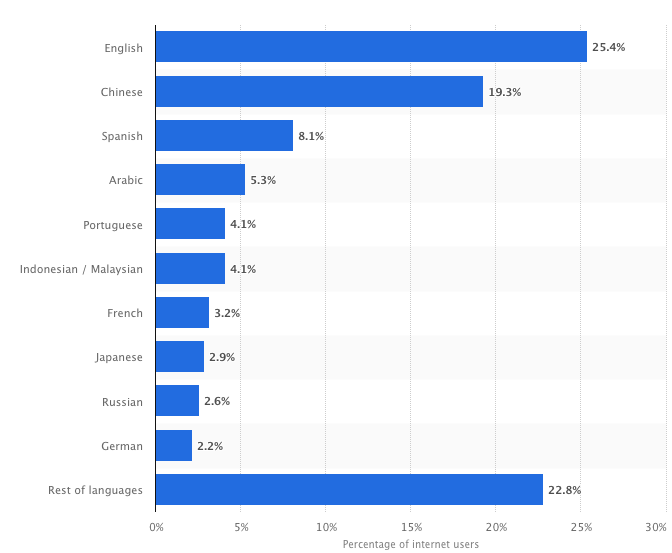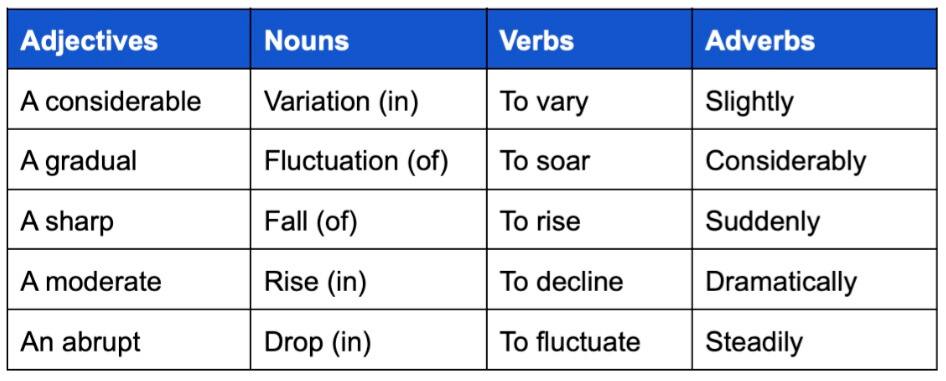Benefits of Knowing a Foreign Language
There are numerous advantages of learning a foreign language. Essay sample is focused on social, health, and other foreign language benefits, as well as reasons to learn another language.

Benefits of Learning a Foreign Language Essay Introduction
Benefits of learning a second language essay body, benefits of learning foreign language essay conclusion, works cited.
Why are foreign languages in demand and popularity? Not everyone probably thinks about it until they face a particular situation. Let us consider several reasons for bilingualism, such as advantages in career, travel, unlimited communication, cultural content, and the fact that knowing at least one foreign language makes the person smarter.
The first cause of foreign language usefulness is professional opportunities. You need to know a foreign language to increase your employability, work in a prestigious fast-growing company, and get the appropriate payment. It also applies to study and internships in foreign countries because plenty of companies are trying to learn from the experience of their foreign colleagues. In the case you know the foreign language, you can help in the translation of texts, preparation of documents, or during negotiations with foreign partners. Besides, you can learn some interesting and helpful information by reading foreign professional literature.
The second reason concerns traveling. Knowing the foreign language, you will be happy to listen to guided tours in original, chat with people with great ease and pleasure, and, who knows, maybe the foreign language you can speak will save the life of someone. Traveling around the world, you can always find your way, talk to the locals, learn about their lives and culture, and perhaps, receive a useful lesson (“Ten Amazing Reasons Why You Should Learn a Foreign Language,” par. 8). In other words, knowing the foreign language allows penetrating the traditions of the other culture.
The third reason in favor of knowledge of a foreign language is communication. Usually, to learn a foreign language well enough, it is necessary to plunge into the environment of living in that particular culture. In turn, such a dive does not pass entirely but forms certain personal qualities. For example, some studies have shown that people, who know more than one language, expand their horizons and are more likely to empathize taking the first steps in communication. Communication in a foreign language with native speakers will significantly strengthen your communication skills and develop life-long friendships (“Ten Amazing Reasons Why You Should Learn a Foreign Language,” par. 14).
Moreover, a foreign language helps you to enrich yourself culturally by watching movies in their original, listening to the voice and intonations of actors, and avoiding translators. You can listen to your favorite songs of foreign singers and understand their meaning with great pleasure. Despite the considerable amount of translated literature, the knowledge of a foreign language opens the door to the world of original literature. It is also essential to point out that by learning a foreign language, you can improve your native language as well. When people start to talk in a foreign language, which has its grammar, logic, and exceptions, they choose words and phrases in the native language to translate, which helps to increase the speech culture and vocabulary of the native language.
Besides, if you are interested in the events taking place in the world, the knowledge of the foreign language would be your advantage. You can easily understand the news as many world newspapers and Internet posts are published in a foreign language. Consequently, you will be able to understand the meaning of the above, taking into account all the details. It is much more objective than hearing a translation, where a lot can be unsaid or translated inappropriately. Thus, knowledge of a foreign language provides access to information, while it is commonly considered that he who owns the information – owns the world.
Finally, the last but not the least reason is probably, the most important. Knowledge of a foreign language expands consciousness. According to Merritt, “speaking a foreign language improves the functionality of your brain by challenging it to recognize, negotiate meaning, and communicate in different language systems” (par. 3). Your mind will be reconstructed to understand completely new concepts. In this sense, learning foreign languages is highly efficient due to switching codes. Switching from one language to another is a challenging job for the brain that is undoubtedly useful. Several studies have shown that among patients with dementia, symptoms began four years later in people who know two languages than in people who know one language (Merritt par. 6). In other words, the brain of bilinguals was struck but continued to operate at a higher level for a longer time.
In conclusion, I would like to emphasize that people are blacksmiths of their happiness, and a lot in life depends on them. Knowledge of foreign languages gives people plenty of advantages. It is the opportunity to travel around the world without an interpreter, to read foreign literature, to watch foreign films in the original, and to have friends from different countries. If you are willing to change something in your life for the better, then learn a foreign language, and maybe somewhere, there is a pleasant surprise waiting for you, such as an exciting journey or attractive employment.
Merritt, Anne. “ Why Learn a Foreign Language? Benefits of Bilingualism. ” The Telegraph . Telegraph Media Group, 2013.
“Ten Amazing Reasons Why You Should Learn a Foreign Language.” Lingholic . n.p., 2014.
Cite this paper
- Chicago (N-B)
- Chicago (A-D)
StudyCorgi. (2020, September 9). Benefits of Knowing a Foreign Language. https://studycorgi.com/benefits-of-knowing-a-foreign-language/
"Benefits of Knowing a Foreign Language." StudyCorgi , 9 Sept. 2020, studycorgi.com/benefits-of-knowing-a-foreign-language/.
StudyCorgi . (2020) 'Benefits of Knowing a Foreign Language'. 9 September.
1. StudyCorgi . "Benefits of Knowing a Foreign Language." September 9, 2020. https://studycorgi.com/benefits-of-knowing-a-foreign-language/.
Bibliography
StudyCorgi . "Benefits of Knowing a Foreign Language." September 9, 2020. https://studycorgi.com/benefits-of-knowing-a-foreign-language/.
StudyCorgi . 2020. "Benefits of Knowing a Foreign Language." September 9, 2020. https://studycorgi.com/benefits-of-knowing-a-foreign-language/.
This paper, “Benefits of Knowing a Foreign Language”, was written and voluntary submitted to our free essay database by a straight-A student. Please ensure you properly reference the paper if you're using it to write your assignment.
Before publication, the StudyCorgi editorial team proofread and checked the paper to make sure it meets the highest standards in terms of grammar, punctuation, style, fact accuracy, copyright issues, and inclusive language. Last updated: January 23, 2024 .
If you are the author of this paper and no longer wish to have it published on StudyCorgi, request the removal . Please use the “ Donate your paper ” form to submit an essay.
These are the benefits of learning a second language

In the US, just 20% of students learn another language. Image: REUTERS/Christian Hartmann
.chakra .wef-1c7l3mo{-webkit-transition:all 0.15s ease-out;transition:all 0.15s ease-out;cursor:pointer;-webkit-text-decoration:none;text-decoration:none;outline:none;color:inherit;}.chakra .wef-1c7l3mo:hover,.chakra .wef-1c7l3mo[data-hover]{-webkit-text-decoration:underline;text-decoration:underline;}.chakra .wef-1c7l3mo:focus,.chakra .wef-1c7l3mo[data-focus]{box-shadow:0 0 0 3px rgba(168,203,251,0.5);} Sean Fleming

.chakra .wef-9dduvl{margin-top:16px;margin-bottom:16px;line-height:1.388;font-size:1.25rem;}@media screen and (min-width:56.5rem){.chakra .wef-9dduvl{font-size:1.125rem;}} Explore and monitor how .chakra .wef-15eoq1r{margin-top:16px;margin-bottom:16px;line-height:1.388;font-size:1.25rem;color:#F7DB5E;}@media screen and (min-width:56.5rem){.chakra .wef-15eoq1r{font-size:1.125rem;}} Education is affecting economies, industries and global issues

.chakra .wef-1nk5u5d{margin-top:16px;margin-bottom:16px;line-height:1.388;color:#2846F8;font-size:1.25rem;}@media screen and (min-width:56.5rem){.chakra .wef-1nk5u5d{font-size:1.125rem;}} Get involved with our crowdsourced digital platform to deliver impact at scale
Stay up to date:.
There are many advantages to learning a second language. Some are fairly obvious. If you find yourself lost in a foreign country, being able to express yourself clearly could help lead you to your destination. Similarly, if your job requires you to travel you may find it easier to vault language and cultural barriers.
But there are other benefits that are not so immediately apparent. For example, learning another language could improve your all-round cognitive ability. It could help hone your soft skills, and even increase your mastery of your mother tongue, too.

Some studies have apparently identified a link between being multilingual and fending off the onset of dementia . Others indicate that being able to speak more than one language can help you become better at multitasking in other aspects of your daily life, too.
Deciding on which additional language or languages to learn is often a matter of chance and personal preference. Maybe you have a parent or grandparent who is a native of another country, so you were brought up being able to speak their language. Perhaps your family regularly took vacations in a particular foreign country when you were a child and that sparked your interest. Or it could just be that you had a very engaging teacher who instilled in you a love for languages.
But deciding whether to learn one at all would appear to be determined more by your mother language than anything else. In short, native-born English speakers are far less likely to learn a second language than many other people.
In the US, just 20% of students learn a foreign language . Meanwhile, in parts of Europe that figure stands at 100%. Across the whole of Europe the median is 92%, and is at least 80% in 29 separate European countries investigated by Pew Research. In 15 of those 29, it’s 90% or more.
Down under, around 21% of people can use a second language , although only 73% of Australian households identified as English-speaking in the 2016 census. In Canada, only 6.2% of people speak something other than the country’s two official languages , English and French.
Have you read?
These are the world’s most spoken languages, our language needs to evolve alongside ai. here's how, here's why we like some words more than others.
In the UK, fewer school students are studying languages to exam levels at ages 16 or 18. Since 2013, the numbers of studying a language at GCSE level – the end of secondary schooling examination taken by most 16-year-olds in England, Wales and Northern Ireland - have fallen between 30% and 50%. Scotland has its own exam system but the drop off in language study is comparable.
The UK has a long-standing tradition of teaching French and German at secondary school level, although not always with tremendous success: Brits are not famed for their multilingual skills. However, the popularity of both those languages has plummeted in UK schools. Less than 20 years ago, just 2,500 students were taking a language other than French, German, Spanish or Welsh – which is a mandatory curriculum requirement in Wales. But by 2017, according to numbers acquired by the BBC, that had shot up to 9,400.
Two languages that are growing in popularity in the UK are Spanish and Chinese, the BBC found. Chinese, of course, is the most widely spoken language in the world. However, in the online sphere it’s a close second to English. Online, English is used by 25.4% of people. For Chinese, it’s 19.3%. Both are way ahead of third-placed Spanish which is used by 8.1% of internet users.
Don't miss any update on this topic
Create a free account and access your personalized content collection with our latest publications and analyses.
License and Republishing
World Economic Forum articles may be republished in accordance with the Creative Commons Attribution-NonCommercial-NoDerivatives 4.0 International Public License, and in accordance with our Terms of Use.
The views expressed in this article are those of the author alone and not the World Economic Forum.
Related topics:
The agenda .chakra .wef-n7bacu{margin-top:16px;margin-bottom:16px;line-height:1.388;font-weight:400;} weekly.
A weekly update of the most important issues driving the global agenda
.chakra .wef-1dtnjt5{display:-webkit-box;display:-webkit-flex;display:-ms-flexbox;display:flex;-webkit-align-items:center;-webkit-box-align:center;-ms-flex-align:center;align-items:center;-webkit-flex-wrap:wrap;-ms-flex-wrap:wrap;flex-wrap:wrap;} More on Education and Skills .chakra .wef-17xejub{-webkit-flex:1;-ms-flex:1;flex:1;justify-self:stretch;-webkit-align-self:stretch;-ms-flex-item-align:stretch;align-self:stretch;} .chakra .wef-nr1rr4{display:-webkit-inline-box;display:-webkit-inline-flex;display:-ms-inline-flexbox;display:inline-flex;white-space:normal;vertical-align:middle;text-transform:uppercase;font-size:0.75rem;border-radius:0.25rem;font-weight:700;-webkit-align-items:center;-webkit-box-align:center;-ms-flex-align:center;align-items:center;line-height:1.2;-webkit-letter-spacing:1.25px;-moz-letter-spacing:1.25px;-ms-letter-spacing:1.25px;letter-spacing:1.25px;background:none;padding:0px;color:#B3B3B3;-webkit-box-decoration-break:clone;box-decoration-break:clone;-webkit-box-decoration-break:clone;}@media screen and (min-width:37.5rem){.chakra .wef-nr1rr4{font-size:0.875rem;}}@media screen and (min-width:56.5rem){.chakra .wef-nr1rr4{font-size:1rem;}} See all

AI is changing the shape of leadership – how can business leaders prepare?
Ana Paula Assis
May 10, 2024

From virtual tutors to accessible textbooks: 5 ways AI is transforming education
Andrea Willige

These are the top ranking universities in Asia for 2024
May 8, 2024

Globally young people are investing more than ever, but do they have the best tools to do so?
Hallie Spear
May 7, 2024

Reskilling Revolution: The Role of AI in Education 4.0

Why investing in people is essential to revive growth: Key quotes from leaders at the #SpecialMeeting24
Gayle Markovitz and Kate Whiting
May 2, 2024

- Language School

Why is it Important to Learn a Foreign Language?

Kendall is a travel junkie, sustainability activist, nutrition guru, personal chef, writer, ...
- button]:border-none [&>button]:bg-white [&>button]:hover:cursor-pointer [&>button]:hover:text-cyan-400"> button]:hover:text-cyan-400 [&>button]:bg-white hover:cursor-pointer" height="1em" width="1em" xmlns="http://www.w3.org/2000/svg">
The advantages of learning foreign languages are mushrooming as the world becomes increasingly globalized and bilingualism is now perhaps the most useful real world skill to ever exist, rather than just being a nifty party trick. If you’re thinking about making the effort to learn a foreign language rather than expecting the world to accommodate your monolingualism, you are a rare breed indeed. Blossoming into the impressive polyglot you aspire to be is 100% feasible with the right approach and mindset.
Foreign language study is all about learning how to truly communicate and connect with others—an incredibly important life skill that can only be cultivated by interacting with people. When you master a foreign language, you can exercise your new superhuman power of being able to understand what someone is saying, recall the proper vocab and grammar, put that vocab and grammar into the proper context, and reply back—all on the spot and in a timely manner. You’ve connected. And that is what it’s all about.

How are you going to make friends if you don’t know how to talk about memes in Spanish?
Why learn a foreign language?
So, why is it important to learn a foreign language? Basically, the advantages of learning foreign languages have the ability to set you up for success in nearly every aspect of your life (NBD). Check out these seven reasons to study a foreign language:
1. Learning a foreign language is sexy
With its warmth and voluptuous sounds, hearing someone speaking a foreign language is like the sound of gold coming to embrace you. Speaking a foreign language is incredibly sexy and it can make you more attractive, interesting, and gives you an air of intelligence. A lot of people find a certain language or accent to be really sexy—think Penélope Cruz’s Spanish or Monica Bellucci’s Italian—you get the picture.
Learn a foreign language and you might just have that certain someone hypnotized and drawn to your exotic prowess. Some of the more romantic languages like, Spanish, the language of undying love containing rhythm that can make any person swoon , or suave French that is soft as silk and feels as warm as a lover’s stroke, and Italian that massages your ears into ecstasy. But really, the rich textures of almost any foreign language can be incredibly sexy.
[ Get matched with foreign language study abroad programs ]

You’ll gain a new appreciation for the hidden (or not-so-hidden) words around you.
2. Travel becomes cheaper and easier when you learn a foreign language
It’s 10 p.m. You just got off a 14-hour flight and all you want to do is fall face-first into your pillow. If you are solely armed with a smattering of navigational terms in the local language, finding your place to crash could turn into a painfully slow process. Without the right lingo, you are limited to expensive or slower options. So you save yourself some time, money, and grief when you learn a foreign language. Just as a few key phrases will make transportation that much faster and cheaper, and the same is true for choosing a place to stay. This means lower rates and a better (even more authentic) experience.
Oh, and the food. When you learn a foreign language, you don’t need to be Anthony Bourdain to find the best local grub. You can ask around for yourself. This valuable intel will usually lead you to far tastier and cheaper fare than any tourism board or guidebook ever could.
[ Get a discount on language classes with Lingoda ]
3. learning a foreign language opens up a world of job opportunities.
It’s no secret that learning a foreign language can improve your employment prospects. More companies than ever are doing business in several—often dozens of—countries around the world, but they can’t do it without hiring people who have a grasp on at least one foreign language. Even in small, local companies, chances are that the ability to speak a second language will set you apart from other applicants. And in an increasingly competitive job market, why not give yourself every possible edge?
But, it’s not just about padding your resume. With globalization in full swing, there’s a good chance you’ll be working with people whose first language isn’t English. Maybe it’s a development team in India, or a manufacturing plant in China, or an alternative energy supplier in Germany. Being able to communicate in other languages makes you much more valuable to an employer and having that competitive edge on your resume is without a doubt an eye-catcher.
[Save and compare foreign language programs side-by-side with MyGoAbroad ]

Now you can sake it to all those mono-lingual losers.
4. Foreign language study grows your brain
Studies have demonstrated the cognitive benefits of learning another language, no matter how old you are. These studies have shown that bilinguals tend to have bigger brains, better memories, are more creative, better problem solvers, etc. Not only do these advantages make it easier to learn yet more languages, they also make it easier to learn, well, anything. The ability to quickly switch between tasks is especially important in today’s busy multitasking world. Bilinguals can switch between tasks much faster than their monolingual counterparts and can handle many more tasks at once.
5. Form meaningful friendships when you study a foreign language
Meeting new and interesting people and developing lifelong friendships are certainly objectives well worth aspiring for, and learning another language is a sure way to expedite that process. Language helps express our feelings, desires, and connect with other humans around us and forms meaningful relationships. Speaking a foreign language not only opens up a massive pool of potential friends, but it also acts as an instant common denominator when you meet native speakers. Plus, speaking in a foreign tongue can be like speaking in secret code with your new besties. This approach is not exactly a foolproof Enigma machine, but it can make discussing the sordid details of Friday night’s debauchery a little less embarrassing.
[ How to Prepare for Intensive Language Programs Abroad ]
6. studying a foreign language makes you more open-minded.
Foreign language study is simply part of a very basic liberal education. To educate is to lead out—to lead out of confinement and narrowness and darkness. Learning a foreign language and getting soaked into an entirely new culture and worldview is the surest way to become an open-minded, understanding, tolerant individual, and that is absolutely priceless. Once you are aware of the fact that we are all cultural beings, products of our own environments, and that you recognize the cultural base for your own attitudes and behavior, you are ready to consider others in a more favorable light. Seeing the world from a different perspective, and understanding where you and others come from, is a fantastic, eye-opening experience.

Pare. Foreign language study time.
7. Foreign language study helps you better understand your own language and culture
Learning a foreign language can actually pull a sort of reverse psychology on you and provide you with a better understanding of your own native tongue and culture. This is one of the most unexpected advantages of learning a foreign language. You will become much more conscious of not only cultural customs, but of the grammar, vocabulary, and pronunciation patterns of your first language. This likely explains the improvements in listening, reading, and writing skills that foreign language impart to former monolinguals.
Next steps to foreign language study
Ready to take the next step to foreign language study? If Duolingo isn’t cutting it, check out these additional resources to help you get the ball rolling:
- Get matched with language study programs at MyGoAbroad
- Compare and contrast language study programs with OnlineAdvisor
- 10 Best Ways to Learn a New Language
- Check out available Language Schools Abroad
- Study Foreign Languages Abroad
- Some Tips for Language Learning Abroad
For even more insider info, remember to always read foreign language study program reviews and reach out to a program advisor with any and all questions you may have.

How are you going to order your baked goods if you don’t know what they are?!
Now you’ll parlez with the best of ‘em!
Learning a foreign language is of the utmost importance and the reasons to study a foreign language are innumerable. Studying (and ultimately fluently speaking) a foreign language helps break barriers and connects human beings on a deeper level of mutual understanding. Plus, reaching this mutual understanding will inevitably open a series of doors leading to a more interesting and satisfying personal and professional life!
Find foreign language study abroad programs

Explore Language Immersion Programs on GoAbroad.com
Related Articles

By Julia Zaremba | 4 days ago

By Munira Maricar | 5 days ago

By GoAbroad 2018 Official Report | 5 days ago

By Rebecca Murphy | 5 days ago
Popular Searches
Recommended programs.

1932 reviews
MAXIMO NIVEL

Europass Italian Language School

Nosara Spanish Institute

Intercultura Costa Rica
Top Language Program Providers
Popular opportunities to check out
Learn and immerse in Thai language and culture
Prepare to speak confidently with the best online tutors, online spanish course for all levels at an accredited school, learn spanish with the top-rated programs in latin america, for travelers, travel resources, for partners.

© Copyright 1998 - 2024 GoAbroad.com ®
- Study Abroad
- Volunteer Abroad
- Intern Abroad
- Teach Abroad
- TEFL Courses
- Degrees Abroad
- High School Abroad
- Language Schools
- Adventure Travel
- Jobs Abroad
- Online Study Abroad
- Online Volunteer Programs
- Online Internships
- Online Language Courses
- Online Teaching Jobs
- Online Jobs
- Online TEFL Courses
- Online Degree Programs
- Search Keywords Search
- Ways to Support
- Board of Directors
- Advisory Council
- Our Partners
- Financial Information
- Programs & Initiatives
- Advocacy Resources
- ACTFL & LCF Awards Program
- Classroom Microgrants Program
- National Teacher of the Year Program
- Student Ambassadors Program
- Teacher Scholarship Program
- Student Resources
The Benefits of Learning Languages
- Language & Careers
- Choose Your Language
- Language Programs & Funding
- Heritage Learners
- LCF Blog & News
- Refer a Professional
- Refer a Student
- Refer a Language Educator
- Teacher Appreciation Week
- Add to the Virtual Inspiration Wall
- Keywords Search

Knowing more than one language is fast becoming a requirement for anyone who wants to compete and thrive in a world where boundaries and barriers are becoming less relevant. In addition to the language itself, multilingual learners can take advantage of the full scope of accompanying cognitive and social skills—making them great employees, leaders in their communities, and true global citizens.
The U.S. Lags Behind in Language Education
Most students in the U.S. graduate high school knowing only one language—making it the only developed country in the world for which language learning is not a recognized priority.
In the United States, only one in five K-12 students 1 (and about one in 12 university students 2 ) is enrolled in a world language class. This is a woefully small number of students, especially when compared to other countries:
92% of students in Europe learn another language in school.
Nearly 1 in 4 Canadians can hold a conversation in both English and French.
Across Africa, more schools are teaching in both the student’s first language and English, French, Dutch, or Portuguese.
While precise measurements are difficult, many sources estimate that one out of every two people on the planet knows at least two languages.
There may have been a time in the U.S. when becoming multilingual was a luxury. But to thrive in an interconnected world—with its expanding population, evolving technologies, and growing emphasis on competing globally—it’s a requirement. And remember, three out of four humans don’t speak English.
Top 10 Benefits of Learning More Than One Language
1. improve your career & business.
When employers list the skills they most seek in a candidate, “knowing more than one language” is listed among the top eight—regardless of the job title, the economic sector, or the candidate’s experience. In other words, whether you’re an engineer, a restaurant server, a salesperson, or a small business owner—any role in any sector—multilingualism will serve your professional goals well.
And while knowing more than one language is a powerful way to distinguish yourself from your peers and colleagues, it’s becoming less of a nice-to-have and more of a job requirement. A full 90% of U.S. employers report relying on employees who speak more than one language—with one in three of these businesses reporting a significant “language skills gap.”
2. Build Deeper Connections With More People
When you can communicate with someone in her language, you open up infinite ways to connect. The entire experience of interacting with your fellow humans—getting to know them, working alongside them—is enriched by sharing their language. You will be shaped by communities. You will be humbled by the kindness of strangers. You will build lifelong friendships.
When you can communicate with someone in her language, you open up infinite ways to connect.
3. Sharpen Your Decision-Making
Decisions made in a second language are more reason-driven than decisions made in your first language. 3 When tackling a challenge in a second (or third or fourth) language, you gain the objectivity and emotional distance you need to properly assess the situation. The result? Clear-eyed choices made through sound, systematic thinking.
4. Feed Your Brain
Research indicates that people who speak more than one language develop a better memory, talent for problem-solving, ability to concentrate, and tendency to be creative than people who speak only one language. Knowing at least a second language also reduces the chances of cognitive decline as you age.
5. Treasure Other Cultures
Culture is the collection of a group’s traditions, arts, customs, social institutions, and achievements, passed from generation to generation. But the surest way to understand a culture—to know it, empathize with it, and come to adore it—is to know its language. In studies, children who have studied an additional language like and respect the culture associated with that language, as well as demonstrate higher levels of empathy and tolerance. Language learning deepens and expands the way we move through the world.
Language learning deepens and expands the way we move through the world.
6. See the World (More Fully)
When you travel somewhere and know the language, the entire experience transforms. Traveling becomes more dynamic—more full of nuance and opportunities. Knowing the language lets you escape the “tourist bubble” and to interact with people and places nobody else could. You can read the street signs to find amazing locales, engage in more meaningful conversation, and immerse yourself in local culture, food, and art.
7. Boost Your Confidence
As you’re learning a language, you’ll make plenty of mistakes—often in front of the audience of your teacher and classmates. But these “mistakes” are actually steps toward becoming a more proficient speaker and more resilient learner. Studying a language allows you to take risks and step into something new and slightly uncomfortable, offering a fantastic chance to grow and mature. And when you eventually find yourself conversing with someone in their language, your sense of accomplishment will be unparalleled.
Studying a language allows you to take risks and step into something new and slightly uncomfortable, offering a fantastic chance to grow and mature.
8. Expand Your Perspective
Learning another language means learning another culture. And learning another culture means drawing comparisons between it and your own culture. You naturally discover places—places both positive and negative—where the cultures diverge. Your understanding of the awesomeness of humanity’s diversity and ingenuity grows in a thousand new directions.
9. Experience Art in Its Original Form
Most of the world’s history and art—its books, news, films, music, essays, stories, and online experiences—are in a language you don’t (yet) know. With more than 7,000 spoken languages on Earth, you could spend countless lifetimes exploring the many source materials if only you knew the language . Reading a love poem by Neruda in its original Spanish, reciting Homer’s epics in their original Greek, or watching “Rashomon” in Kurosawa’s original Japanese—these are all profound experiences that only language learning can offer.
10. Become a Polyglot
When you learn a second language, two amazing things happen. First, you come to know and speak your first language better. Second, learning a third language is much easier than the second (especially for children). 4 Take a bold step toward communicating in as many languages as you choose!
- Entertainment
- Environment
- Information Science and Technology
- Social Issues
Home Essay Samples Science Second Language
The Importance of Learning a Foreign Language
Table of contents, breaking down barriers, cognitive benefits, professional advantages, cultural enrichment, role of education, references:.
- Bialystok, E. (2001). Bilingualism in Development: Language, Literacy, and Cognition. Cambridge University Press.
- Crystal, D. (2017). English as a Global Language (2nd ed.). Cambridge University Press.
- Dewaele, J. M. (2018). Why the dichotomy ‘L1 versus LX user’ is better than ‘native versus non-native speaker’. Applied Linguistics, 39(2), 236-240.
- Grosjean, F. (2010). Bilingual: Life and Reality. Harvard University Press.
- Nikolov, M. (2009). Early Learning of Modern Foreign Languages: Processes and Outcomes. Multilingual Matters.
*minimum deadline
Cite this Essay
To export a reference to this article please select a referencing style below

- Animal Intelligence
- Broken Windows Theory
Need writing help?
You can always rely on us no matter what type of paper you need
*No hidden charges
100% Unique Essays
Absolutely Confidential
Money Back Guarantee
By clicking “Send Essay”, you agree to our Terms of service and Privacy statement. We will occasionally send you account related emails
You can also get a UNIQUE essay on this or any other topic
Thank you! We’ll contact you as soon as possible.
- Undergraduate Admission
- Graduate Admission
- Tuition & Financial Aid
- Communications
- Health Sciences and Human Performance
- Humanities and Sciences
- Music, Theatre, and Dance
- IC Resources
- Office of the President
- Ithaca College at a Glance
- Awards and Accolades
- Five-Year Strategic Plan
- Public Health
- Directories
- Course Catalog
- Undergraduate
Why You Should Study a Foreign Language
Exposure to diverse languages and cultures is a critical component of a quality education, and the benefits of language study are well documented in many essential areas:
- The study of language brings students into contact with people and cultures that are very different from their own, and in a way that encourages respect for diversity. This exposure lowers the barriers that are often at the root of fear and distrust of others. Thus, the knowledge gained from language study contributes to empathy and tolerance towards diverse peoples and reduces prejudice both at home and abroad.
- The study of foreign languages not only broadens students’ perspectives of the world, but also imparts a more profound understanding of their own cultures. Exposure to cultures with long histories builds a greater sense of the past within one’s own culture as well.
- Foreign language study increases students’ skills in the use of English. Often it is in the foreign language classroom that students gain the greatest understanding of grammar and expand on their vocabulary. Learning the linguistic roots of language further deepens these abilities.
- The study of foreign languages enhances listening skills and memory, increases analytical abilities, and builds aptitude in problem solving and working with abstract concepts. It has been shown to enhance the study of other subjects. Abilities in math and English increase, and creativity grows.
- The study of foreign language is a distinct advantage in the professional world. Job candidates who are proficient in more than one language are extremely valuable and have a competitive edge in the U.S. economy, where a large proportion of jobs involve work with immigrants and/or are the result of trade with foreign countries. Students who have studied foreign language have more job opportunities available to them both at home and abroad, in an increasingly global society.
- Graduates often cite language courses as among the most valuable in helping them to increase their communication skills overall in college, allowing them to obtain desirable employment in a wide range of areas. Language study opens doors in countless fields, including business, marketing, government, medicine, technology, law, and the military.
- The study of foreign languages and cultures leads students to become more responsible and committed global citizens. It reduces the barriers to travel and, therefore, encourages continued exposure to other cultures and allows individuals to interact more fully with others.
- The study of diverse languages and cultures is a gateway to greater understanding and appreciation for a wide range of other subjects, including art, music, cuisine, film, science, and philosophy. It educates and broadens the mind in limitless ways and is the true core of a liberal education.
7 reasons to learn a foreign language
Associate University Librarian; Adjunct Faculty, Fairleigh Dickinson University
Disclosure statement
Kathleen Stein-Smith does not work for, consult, own shares in or receive funding from any company or organisation that would benefit from this article, and has disclosed no relevant affiliations beyond their academic appointment.
View all partners

Half of the world population is bilingual , but only 25% of Americans can hold a conversation in another language.
Changing that is one of the goals of language advocacy efforts, such as the Lead with Languages campaign. As the author of a book on what I refer to as America’s language deficit , here are what I see as seven of the best reasons for America’s young to speak a language besides English.
1. Makes you smarter
Research has shown that knowledge of more than one language is associated with better reasoning , problem-solving skills and creativity. It also helps people deal with unknown and unfamiliar situations. Use of another language tends to delay the onset of dementia
2. Boosts academic achievement
Language learning supports academic achievement . This is true for English-speaking students studying a foreign language, as well as English language learners in bilingual and immersion programs. It also boosts academic outcomes at the college level .
Being bilingual has also been shown to especially benefit low-income children in terms of “their ability to direct and focus their attention when distractions were present.” Another study found that kids whose families spoke a second language at home scored better on cognitive tests than those whose family only spoke one language.
3. Provides professional and career advantages
Foreign language skills are associated with increased job opportunities . Research has shown that demand for bilingual workers in the United States has doubled from 2010 to 2015. About 11 million U.S. jobs are related to exports, and most of the top trading partners of the U.S. use languages other than English. While not all positions in export necessarily requires a second language, it is important to remember that 6.8 million American workers are employed by international companies operating in the United States. Nine out of 10 U.S. employers rely on employees with language skills other than English, and [one in four] U.S. employers lost business due to a lack of language skills.
4. Provides broader access to education and information
If you speak another language, you could earn a degree in another country, which could end up being a less expensive way to get a college education. If nothing else, it at least enables you to better enjoy studying abroad and to learn more than you would if you only spoke English.
The same is true when it comes to the news media. Those who only speak English cannot directly access news and perspectives in parts of the world where other languages are predominant.
5. Gives you more social and global skills
As more than 60 million people in the U.S. speak a language other than English at home, those who only speak English miss out on being able to directly communicate in the mother tongue of many friends and neighbors. Language learners also tend to develop a more positive attitude toward both the language and the culture of the country where it is spoken.
In the case where a language may be part of our own cultural heritage and identity, building on the knowledge of that language makes it possible for us to reconnect with the experience of past generations of family.
Speaking another language also opens up opportunities to do business and work in other parts of the world. Overall, 75% of the world population does not speak English. Those who only speak English may also be limited and less inclined to collaborate with others around the world to address global issues.
6. Increases national security
On the national security front, various federal agencies and departments concerned with national security, including the FBI, CIA, and the Departments of State, Homeland Security, and Defense, need more agents and employees who can speak and understand another language. This need was underscored in the wake of the 9/11 attacks, when it surfaced that lack of Arabic linguists led the U.S. to miss critical messages sent by al–Qaida about the 9/11 attacks a day before they occurred.
7. Life is more interesting
Think of all the people here in the U.S. (well over 60 million ), around the world ( 75% of the world population), and online whom we are able to talk to if we speak their languages.
[ Deep knowledge, daily. Sign up for The Conversation’s newsletter . ]
- National security
- Foreign Language
- Job prospects
- World languages
- foreign languages

Case Management Specialist

Lecturer / Senior Lecturer - Marketing

Assistant Editor - 1 year cadetship

Executive Dean, Faculty of Health

Lecturer/Senior Lecturer, Earth System Science (School of Science)
The Importance of Foreign Language Skills in International Education and Education for Global Citizenship
- First Online: 25 August 2016
Cite this chapter

- Kathleen Stein-Smith 2
537 Accesses
1 Citations
International education, whether envisioned as study abroad, learning about other cultures, internationalizing the curriculum, or as education for global citizenship, implies knowledge of other languages and cultures. There have never been more college and university students studying abroad, and foreign language and cultural skills are needed for academic coursework, career preparation, and for maximization of the study abroad experience. In addition, college and university faculty and staff who work with international students would benefit from knowledge of their languages and cultures.
The ability to communicate in other language is a global competency in the workplace, in the classroom, and in an increasingly globally mobile world. Much has been written about the importance of business and technical foreign language skills in the workplace, but multilingualism is increasingly important in education and for global citizens in an increasingly interconnected world.
This is a preview of subscription content, log in via an institution to check access.
Access this chapter
- Available as EPUB and PDF
- Read on any device
- Instant download
- Own it forever
- Compact, lightweight edition
- Dispatched in 3 to 5 business days
- Free shipping worldwide - see info
- Durable hardcover edition
Tax calculation will be finalised at checkout
Purchases are for personal use only
Institutional subscriptions
Author information
Authors and affiliations.
Fairleigh Dickinson University, Teaneck, New Jersey, USA
Kathleen Stein-Smith
You can also search for this author in PubMed Google Scholar
Rights and permissions
Reprints and permissions
Copyright information
© 2016 The Author(s)
About this chapter
Stein-Smith, K. (2016). The Importance of Foreign Language Skills in International Education and Education for Global Citizenship. In: The U.S. Foreign Language Deficit. Palgrave Macmillan, Cham. https://doi.org/10.1007/978-3-319-34159-0_4
Download citation
DOI : https://doi.org/10.1007/978-3-319-34159-0_4
Published : 25 August 2016
Publisher Name : Palgrave Macmillan, Cham
Print ISBN : 978-3-319-34158-3
Online ISBN : 978-3-319-34159-0
eBook Packages : Social Sciences Social Sciences (R0)
Share this chapter
Anyone you share the following link with will be able to read this content:
Sorry, a shareable link is not currently available for this article.
Provided by the Springer Nature SharedIt content-sharing initiative
- Publish with us
Policies and ethics
- Find a journal
- Track your research
The Benefits of Knowing a Second Language Essay
Can I see a show of hands of those of you who know a second language? Okay, and now can I see a show of hands of those who wish they knew a second language? I am here to explain to you why it is important and so beneficial for everyone to know a second language. There are more benefits to knowing a second language than it just seems “cool.” The main advantages of knowing a second language are your professional growth, improvement of mental health, and development of cognitive abilities.
The first argument in favor of learning a second language is the fact that the development of cognitive abilities in the learning process helps maintain mental health. Multiple studies have shown that bilingual people are less likely to have dementia in senior age, or its development occurs 4-5 years later than in monolingual people (Roberts & Kreuz, 2019). Many people attribute this to the fact that the cognitive abilities of bilingual people are more developed, especially if they use several languages and practice them. However, no evidence explains the physiological processes associated with this fact. Nevertheless, even without understanding which hormones and brain areas are involved in this process, learning a new language is worth the effort to avoid dementia and Alzheimer’s disease.
Moreover, the cognitive development of a person who speaks several languages is much higher overall. Developed language skills are associated with the growth of the hypothalamus and areas of the cerebral cortex, which are responsible for memory and thoughts (Charman, 2016). In other words, a person stimulates areas of the brain and improves his memory and sharpness of thinking by learning a new language. Besides, we usually use reading, listening, and remembering to learn the words and structures, which enhances our attentiveness and concentration.
Scientists also note that knowing another language helps people expand their horizons of perception since different languages have terms that do not exist in others. For example, in Japanese, there are more words for shades of blue than in English, while Namibian Himba people divide all colors into only five groups (Charman, 2016). Thus, knowing several languages helps people better understand and perceive the world around them.
Another advantage of learning a second language will become evident to you if you go to any site for a job search. In many vacancies, you can see that a second language is necessary or desirable as this expands the possibilities of collecting information and communicating. This skill is needed for nurses, social workers, entrepreneurs, politicians, and even IT professionals to maintain communication in a globalized world. In addition, this ability will provide you with work in any of these areas as a translator.
Knowing of few languages also makes you a better employee, since thinking in bilingual thinking makes increases analytical and negotiating abilities, as you analyze the words more carefully (Penarredonda, 2018). For example, you can always pretend that you are choosing words, or you didn’t understand the question correctly if you said something wrong, and your opponent does not take these words seriously. Thus, the benefits of knowing a second language are both the obvious ability to communicate and gather information, as well as the latent possibilities of the brain.
In conclusion, learning a second language has many advantages that are inseparable. Each of you can choose your own reason to attend classes in Spanish, French, or Chinese to motivate yourself. It can be a desire to get the best job, to be open to the world, or avoid mental diseases. However, not a single person who cares about his or her future will be able to declare that such a reason does not exist.
Charman, A. (2016). How learning languages affects our brain . European Commission. Web.
Penarredonda, J. L. (2018). The huge benefits of working in your second language . BBC. Web.
Roberts, R., & Kreuz, R. (2019). Can learning a foreign language prevent dementia? The Mit Press Reader. Web.
- Chicago (A-D)
- Chicago (N-B)
IvyPanda. (2022, February 12). The Benefits of Knowing a Second Language. https://ivypanda.com/essays/the-benefits-of-knowing-a-second-language/
"The Benefits of Knowing a Second Language." IvyPanda , 12 Feb. 2022, ivypanda.com/essays/the-benefits-of-knowing-a-second-language/.
IvyPanda . (2022) 'The Benefits of Knowing a Second Language'. 12 February.
IvyPanda . 2022. "The Benefits of Knowing a Second Language." February 12, 2022. https://ivypanda.com/essays/the-benefits-of-knowing-a-second-language/.
1. IvyPanda . "The Benefits of Knowing a Second Language." February 12, 2022. https://ivypanda.com/essays/the-benefits-of-knowing-a-second-language/.
Bibliography
IvyPanda . "The Benefits of Knowing a Second Language." February 12, 2022. https://ivypanda.com/essays/the-benefits-of-knowing-a-second-language/.
- The Benefits of Being Bilingual in a Global Society
- Parents Challenges: Raising Bilingual Children
- Bilingual Education: Benefit in Today’s World
- English as a Global Language and Its Supremacy
- "The Nobel Lecture in Literature" by Toni Morrison
- Linguistic Anthropology. Speech Community
- Language and Logic: The Similarities and Differences
- Reasons for Studiyng Chinese Right Now
Student Essay: The Value of Foreign Languages

Tips for Online Students , Tips for Students
Why Is Language Important? Your Guide To The Spoken Word
Updated: February 27, 2024
Published: June 9, 2020

Language is a vital part of human connection. Although all species have their ways of communicating, humans are the only ones that have mastered cognitive language communication . Language allows us to share our ideas, thoughts, and feelings with others. It has the power to build societies, but also tear them down. It may seem obvious, but if you’re asking yourself, why is language important? You’ll have to break it down to truly understand why.
Why Is Language Important? Language Matters
Language is what makes us human. It is how people communicate. By learning a language, it means you have mastered a complex system of words, structure, and grammar to effectively communicate with others.
To most people, language comes naturally. We learn how to communicate even before we can talk and as we grow older, we find ways to manipulate language to truly convey what we want to say with words and complex sentences. Of course, not all communication is through language, but mastering a language certainly helps speed up the process. This is one of the many reasons why language is important.
Language Is Important To Culture And Society
Language helps us express our feelings and thoughts — this is unique to our species because it is a way to express unique ideas and customs within different cultures and societies.
By learning a foreign language , you can understand ideas and thoughts that may be different from your own culture. You can learn customs and how people interact in a given society. Language helps preserve cultures, but it also allows us to learn about others and spread ideas quickly.
Language Is Important To Business
The importance of language in business is unmatched. Without language here, we can’t share ideas and grow them into something more. Whether this means learning a foreign language so you can share ideas with people who come from a different country, or simply learning how to use language to master an interview, demand presence in a room, or network with others, language is vital.
Language Is Important For Individuals And Development
Humans all learn to talk at slightly different times, and observing when a child starts to use language can be indicative of how well they are developing. But this does not just apply to babies. It also applies to young children learning a second language in school that’s different than the language they speak at home, adults learning a second language , or even those who may have lost language due to some type of accident, and are working on regaining it.
Language Is Important For Personal Communication
Though much of human communication is non-verbal (we can demonstrate our thoughts, feelings and ideas by our gestures, expressions, tones, and emotions) language is important for personal communication. Whether it’s being able to talk to your friends, your partner, or your family, having a shared language is necessary for these types of interactions.
Image by Sasin Tipchai from Pixabay
The basic functions of language.
The main function of language is the use of language. It gives us the ability to communicate thoughts, ideas, and feelings with others as quickly as possible. But, within that, we can understand language more by looking at its basic functions.
1. Informative Function
The informative function of language is when we use language to communicate any information. Essentially, its function is to inform others by being able to state facts clearly.
2. Expressive Function
Another basic function of language is the expressive function. As it sounds, it is used to express oneself by giving us ways to convey our feelings, emotions, and attitudes to another person (or ourselves).
3. Directive Function
The directive function of language is a basic function that helps us to direct or command. For example, it gives us the ability to tell ourselves or someone else what to do in any given situation.
Different Types Of Language
In addition to language functions, there are also different types of language and ways to understand language overall. Being able to differentiate these can help you understand other reasons why language is so important.
Oral Vs. Written Language
In general, oral communication is spoken language meant for conversing with others. Written language is about expressing ideas through writing words down.
Oral communication is usually more informal and faster, while written language is more formal and slow.
Denotative Meaning Vs. Connotative Meaning
Words have a lot of meaning to them, and the meaning depends on the context surrounding the word. This is why there is denotative meaning and connotative meaning.
Denotative meaning is the literal definition/intention of the word, whereas connotative meaning is when words carry positive or negative meanings/connotations. An example of this could be “home” versus “house.” “House” is denotative, being the literal term for this type of structure where someone may live, whereas “home” is connotative and represents a shelter, family, security, etc. Understanding the difference can help you understand the intention of language.
Six Elements Of Language
There are six elements of language:
- Clarity: Using language in a way that ensures the intended audience fully understands your ideas; that your ideas are clear.
- Economy: Being ‘economic’ about how you speak by avoiding any unnecessary language. This means using only the necessary and appropriate words to express yourself while avoiding using language your audience won’t understand. Essentially, this means avoiding fluff or complicated vocabulary.
- Obscenity: This refers to ‘indecent language’, including, but not limited to, curse words and hateful remarks.
- Obscure Language/Jargon: This is very specific language that your audience will not understand because they are not familiar with what you are talking about. This could be when your car mechanic explains to you what’s wrong with your car, but you are not a car mechanic, so you are unclear of what they’re talking about.
- Power: This is when someone uses language to exert power over someone to manipulate them, command them, or to get them to do something they want. It could also be to demonstrate yourself as an authority in the room.
- Variety: This is a speaker’s ability to use a combination of all the different types of language aforementioned to successfully and creatively get ideas across.
Image by Aline Dassel from Pixabay
Different language styles.
Within language, there are many different styles to fit what the speaker wants to communicate. While some are unique to a person’s personality, some speakers may adapt certain styles depending on the situation, even if it’s different from how they normally speak.

1. Direct And Indirect Styles
Direct is a way to use language to indicate to a person exactly what you want to say and/or how you’re feeling. Indirect language means using other words or types of communication to demonstrate you may be feeling a certain way, but without directly saying why or what, in other words, being indirect. If you’ve ever been in an argument with a significant other, you probably have experienced both of these language styles.
2. Personal And Contextual Styles
These two language styles are a bit more complex. In general, personal style refers to an individual’s personal way of speaking, is informal, and focuses on that individual. Contextual styles means changing language depending on the context of a situation. For instance, a professor may use their personal style of speaking with friends and colleagues, and a contextual style when lecturing their students.
3. Untranslatable Words
Untranslatable words are words or phrases that we have to adapt from other languages because we do not have a word that means the same thing in our own language. A good example is how we say “Bon Appetit!”, because we don’t have a good translation.
Using Language Effectively
Language has so many benefits to humans, but it can also be problematic if language is used ineffectively. This is why it’s important to be mindful of how you are using language in any situation.
1. Use Appropriate Language
Using appropriate language does not just mean avoiding obscene language (there may be times when that is actually appropriate for the situation!). It means using language that’s appropriate for your audience, that they can understand, relate to, and engage with.
2. Use Vivid Language
To use vivid language is to use imagery in your language, to describe something as vividly as possible. It may mean using more adjectives or onomatopoeia to illustrate what you’re saying.
3. Use Inclusive Language
Inclusive language means using language that does not exclude any person. For instance, instead of using “he or she” to address an audience, the correct term is “they” to include people who may not identify with a particular gender. It also means avoiding any language that is racist, sexist, misogynist, hateful, presumptuous, prejudiced, etc.
Language Is Changing Along With The Culture
When discussing topics like inclusive language, it’s easy to recognize that language, today, is changing alongside culture. With technology comes trends or different ways of speaking, like how many teenagers or young people use slang when they speak. When societies become more open-minded and progressive, we start accepting that there are many other ways of speaking language.
Many of us know the answer to why is language important, but we often take language for granted or actually don’t think about it. Language is an important life skill, particularly in school and in the workplace.
Related Articles
- Essay Samples
- College Essay
- Writing Tools
- Writing guide

Creative samples from the experts
↑ Return to Essay Samples
Argumentative Essay: Why is it so Important to Know More than One Language
We live in a multilingual world that is becoming increasingly globalized and it is therefore very important to know more than one language. There are three main reasons for this: an additional language can help you progress in your career, you gain an awareness of other cultures, and it helps increase our understanding and knowledge of our own language.
More and more job advertisements are now specifying that they want second, third, and even fourth languages in some cases, and knowing more than one language opens up your prospects in a highly important way. Furthermore, as more and more companies begin to trade internationally, people are frequently beginning jobs for which they need no language skills, but then being asked to relocate abroad, or offered a promotion that requires language skills. Therefore, it helps with career enhancement. Some people refute this claim by saying that there are plenty of other jobs available, but this is simply not the case anymore with the global recession and more countries being international.
The second reason that it is important to know more than one language is that it increases cultural awareness and allows you to communicate with different people. All good methods of learning languages also entail learning about another culture, especially when your language skills get to a higher level. This awareness allows people from different nationalities and religions to get along with each other better, which is very important given the high levels of immigration. Many countries with high immigration levels have trouble with a lack of integration, and this is often because of the language barrier, so people end up being segregated, staying in communities where their own language is spoken. Even those that say they don’t care about meeting people of other cultures will have noticed these problems, and should accept the importance of learning other languages.
Finally, people should learn additional languages because it helps with their mastery of their own language and it is proven to be good for the brain. Some people believe that learning more languages leads to confusion, but besides the odd word being misused, this is simply not the case. If you learn a new language, you have to study the grammar from scratch, and therefore end up with a much more in-depth knowledge of grammar as a whole than people who only speak one language. Furthermore, if you learn languages with similar roots learning one can help you learn the others (take French, Spanish and Italian, for example).
Overall there can be no denying that learning languages is wholly positive for individuals and society and that it is highly important to know more than one language. If more people were multilingual, the world would ultimately be a happier and more prosperous place.

Follow Us on Social Media
Get more free essays

Send via email
Most useful resources for students:.
- Free Essays Download
- Writing Tools List
- Proofreading Services
- Universities Rating
Contributors Bio

Find more useful services for students
Free plagiarism check, professional editing, online tutoring, free grammar check.
- Skip to main content
IELTS Podcast
Pass IELTS with expert help.
15 Benefits of Learning a Foreign Language
Learning to speak a foreign language is often times considered a necessity of successfully integrating and functioning in a particular community.
Communicating effectively helps you to get the most out of your foreign experience. Imagine being lost in a country where you don’t speak the language and the locals don’t speak yours. You have to retort to signing, pointing and google translate.
The need for communication is essential and quite evident in these kinds of scenarios. The same can be said for someone who has moved to a different country for a new job, vacationing in a foreign country or an English teacher teaching abroad.
Benefits of learning a new language
In all these cases knowing a foreign language would prove to be quite useful in day-to-day life. There are a number of benefits attached to learning a foreign language , and here are just a few of them.
1. Learning a foreign language accelerates brain power
Speaking a language helps you to access multiple areas of your brain, this is because each language requires differing skills with regards to pronunciation, etymology, structural rules and varying degrees of complexities. It therefore makes sense that the more languages you speak the more brain power you exude. Think of a foreign language as a gym session for your brain. The result? Quicker and clearer processing of information, enhanced reading techniques, and accelerated problem-solving skills.
2. It helps your brain develop how to multitask
Have you ever watched someone switch between two or more languages? It is something quite awe-inspiring. It could be equated to watching a juggler juggling a bunch of clubs with intense precision, switching back and forth between languages creates the same effect. Your brain is essentially tapping into each language’s specific mechanics, simultaneously. Your brain is exercising and stretching its multitasking abilities, therefore speaking a foreign language could help you increase your ability to switch back and forth between various daily activities with ease.
3. The onset of Dementia and Alzheimer’s is stalled
Studies that focus on the onset of Alzheimer’s found that the development of dementia and Alzheimer’s amongst multilingual individuals was delayed. According to the study, Alzheimer’s symptoms only start developing at the age of 75 or more amongst those who were multilingual compared to the age of 71 or less for those who only spoke one language. This outcome was concluded considering that all other factors were held equal. This means factors such as overall health, diet, economic status, and education level weren’t considered.
4. It improves memory and retention

Learning a new language requires you to retain a great amount of new information. This includes an excess amount of vocabulary, structural rules and pronunciation requirements. Not only are you learning and memorising all these new concepts you are also making your brain use them as a communication tool. As such, learning a foreign language essentially strengthens your brain’s memory as it forces it to recall newly learned information, the brain is then required to associate this information with mnemonics resulting in better retention.
5. Gives the mind a slight information processing edge
Learning a new language can prove to be a rather challenging task. This is because languages tend to be linked to more than just learning vocabulary but also have historic and cultural links to their country of origin. This makes learning a new language quite difficult and challenging and as such requiring strong will, discipline and focus, ultimately building critical thinking skills. These skills can then be aptly used in an online course for passing IELTS .
6. Improves decision-making abilities
When you learn a foreign language not only are you learning new vocabulary you are also learning idioms and phrases that are nuanced and specific to that language. This means learning a new language is not simply about knowing vocabulary but also knowing how appropriate and relevant the words you have learned are in a social construct. Multilingual people not only have to weed through different languages in their minds, they have to decide which words to use appropriately in any given conversation. This requires critical-thinking, decision-making skills and on the spot problem-solving.
7. Improves ability to speak first language
One of the tools used for learning a new language is translating words back to the learner’s home language or first language. This means that the foreign language is first introduced through the lens of your home language, as a result, you are forced to expand your own home language skills. It also means you might need to search for the appropriate home language words to accurately translate the foreign words you are learning.
8. Enhances performance in various academic areas

Knowing a foreign language while tackling academics could prove to be quite a magic trick to pull out of the hat. As already stated, learning a foreign language requires intense focus and self-discipline. This means when it comes to studying techniques such as cramming and memorisation your brain has already been basted. You have exercised brain muscles that monolinguals haven’t even accessed yet. This will of course translate to test and exam scores that have been affected by your brain’s ability to study and retain information. Learning a foreign language also helps you to improve your comprehension abilities as your brain has to not only learn new words but also understand them. As such, studying and comprehending what you have studied becomes a lot easier. As a result reading and understanding exam vocabulary becomes easier and correcting written work such as essays requires less effort.
9. Allows individuals to be more open and receptive of other people’s cultures
As previously mentioned learning a foreign language requires you to somewhat understand the history and culture of the language’s origins. This means delving head first into the language’s associated culture; including foods, political associations, music, dance, and history. In order to successfully immerse yourself; you will need to have an open mind and receptive energy. This allows you to be appreciative of differences and less fearful of learning how different people do things.
10. Speaking a foreign language opens up various career opportunities
Well this one makes total sense, earlier we mentioned moving to a foreign country for a new job. Even though you don’t need to speak a country’s language to get the opportunity to work there, knowing the language certainly gives you an advantageous edge. Corporates want to know that you will do well in your role before hiring you, knowing the language strongly signals that you would be in the best position to perform your role well.
11. Builds self confidence

Successfully mastering a concept that is foreign and completely new to you is reason enough to feel extremely accomplished within your own abilities. Learning a new language helps you prove to yourself that you have enough self-discipline, perseverance and strong-will to produce results, which is certainly a confidence booster. Every time you are able to flex your language skills you are essentially injecting a new dose of confidence into your life.
12. It helps in self-discovery and self-actualization
Proving to yourself that you are completely capable of achieving something that you put your mind to helps you come to terms with yourself and all your capabilities. As you dive into all the intricacies and complexities that go with learning a foreign language you get to know yourself a little more, and finally having a full conversation in that language allows you to reach a state of self-actualization.

13. It opens doors to different forms of expression
This benefit is especially perfect for those who express themselves in some form of artistic expression. Whether this is poetry, music, writing or singing, learning a new language gives you a new form of self-expression. You allow your brain to tap into a new artistic wave length where you can produce your art in a different and new way.
14. Expands your potential pool of dating candidates
A language barrier is absolutely not a sufficient reason to eliminate a potential dating candidate as history proves that people from different backgrounds and languages can successfully fall in love and live happy lives. However, knowing your potential love interest’s language promises a much smoother romantic interaction.
15. Allows you to successfully integrate yourself into a different culture
Moving locations and starting over is certainly not an easy feat, in fact, it is one of the most difficult things one might ever have to do. Knowing the foreign language of the country you will be calling your new home will make this transition much easier. You won’t struggle with basic things such as asking for directions or reading road signs. The challenges of moving won’t disappear but they certainly won’t feel all-encompassing.

- IELTS Scores
- Life Skills Test
- Find a Test Centre
- Alternatives to IELTS
- General Training
- Academic Word List
- Topic Vocabulary
- Collocation
- Phrasal Verbs
- Writing eBooks
- Reading eBook
- All eBooks & Courses
Learning a Foreign Language Essays
by Dhruvisha Shah (Ahmedabad, Gujarat, India)

Would you prefer to share this page with others by linking to it?
- Click on the HTML link code below.
- Copy and paste it, adding a note of your own, into your blog, a Web page, forums, a blog comment, your Facebook account, or anywhere that someone would find this page valuable.
Band 7+ eBooks
"I think these eBooks are FANTASTIC!!! I know that's not academic language, but it's the truth!"
Linda, from Italy, Scored Band 7.5

IELTS Modules:
Other resources:.
- All Lessons
- Band Score Calculator
- Writing Feedback
- Speaking Feedback
- Teacher Resources
- Free Downloads
- Recent Essay Exam Questions
- Books for IELTS Prep
- Useful Links

Recent Articles
Useful Language for IELTS Graphs
May 16, 24 04:44 AM

Taking a Gap Year
May 14, 24 03:00 PM
IELTS Essay: Loving Wildlife and Nature
May 10, 24 02:36 AM
Important pages
IELTS Writing IELTS Speaking IELTS Listening IELTS Reading All Lessons Vocabulary Academic Task 1 Academic Task 2 Practice Tests
Connect with us
Copyright © 2022- IELTSbuddy All Rights Reserved
IELTS is a registered trademark of University of Cambridge, the British Council, and IDP Education Australia. This site and its owners are not affiliated, approved or endorsed by the University of Cambridge ESOL, the British Council, and IDP Education Australia.
Why should you learn a new language?
Learning a new language is a complex task, but the benefits of language learning include social and cultural connections, as well as health and cognitive advantages . Research shows that it's never too early or too late to start learning a new language -- our brains are far more adaptive and flexible than previously thought, and our brains are built for language learning! Whether you are 8 or 80, learning French or Korean, studying a new language for the first time ever or for the first time in 50 years, there's never been more reason and more support for learning a new language.

Connect to people and cultures
Language is all about communication and connection, and studying a new language brings people and cultures closer to us. At the beginning, learning a language might feel like all vocabulary and grammar, but it doesn't take long to build up the skills to make meaningful connections in the new language. In fact, the Common European Framework of Reference for Languages (or CEFR ) prioritizes personal, family, and descriptive language for beginners.
Learners today have more access to more languages -- Duolingo has courses in 40 languages -- and so the importance of personal and cultural reasons for language study is becoming clearer. A recent report shows that interest in culture drives learners to Korean, and this trend is likely linked to the rise of Korean entertainment and media, including K-pop and Korean dramas. The study also shows that family reasons are especially important for those choosing to study Chinese. Language is such a strong link to heritage that in some places we see the local language has become more popular on Duolingo than languages like Spanish and French: Hawaiian and Japanese are now the second and third most popular languages to study in Hawaii, and Irish has overtaken Spanish as the most popular language to study in Ireland.
Challenge your brain
Adults' brains may not be quite as flexible as children's, but they are still really adaptable and ready to learn! Most learners can reach their communication goals without striving for the vaguely-defined concept of "fluency," and your adult brain is definitely equipped for that kind of language learning. Even after just a few months of language study, adult learners' brains show changes and even some processing patterns like those of native speakers. And after a year of learning, adults show improvements in the kind of cognitive adaptations that make bilinguals successful in switching between their languages.

Being bilingual trains your brain to perform a cognitively complex task: turning one language "down" while turning the other "up," in every interaction, for every word! Bilinguals' brains treat languages like a seesaw, raising one up higher when it's needed, and pushing lower the one not being used. This push-and-pull in their brains gets bilinguals practicing a specific kind of attention and control .
Bilinguals who codeswitch , or use both their languages in the same conversation , are getting another kind of cognitive workout by keeping their language seesaw balanced: they might move from all one language, to all another language, and then to really sophisticated systems of mixing that use both languages at once!
Support healthy aging
For older adults, language learning can serve as an engaging activity that promotes problem solving and strategizing, which research shows can improve cognitive functioning .
Languages provide new ways of interacting with people in our communities and around the world. While students may have the option of learning a new language in school, technology makes it easier than ever before for older adults to learn, too. Apps, virtual language meet-ups like Duolingo Events , and online forums give adults ways to engage directly with language practice partners and native speakers. Exploring new cultures, travel, and making new social connections with people around the world can also have a positive impact on older adults. For example, research shows that interacting more regularly with more people has benefits for older adults' health and quality of life .
Bilingual adults who use their languages regularly may even show a delayed onset of dementia symptoms compared to monolinguals -- bilingual brains are better able to resist the disease and function healthily for longer!
It's never too early or too late to start learning!
From your brain's perspective, people of any age can learn new languages -- but it's typically harder for adults to find the time and resources to get the learning to stick. Language learning takes time and patience, and it should also be enjoyable.

The best way to learn a language is whatever method motivates you to keep at it! Here are some ways to start your learning journey today:
- Use free tools and resources to try different things and discover what works for you.
- Find ways to practice a little bit at a time, every day. It's better to study 5 minutes every day than an hour one day a week!
- Link your study time with other parts of your schedule to help you remember and fit in language practice. You could do lessons with your morning coffee, read a bit on your afternoon commute, or listen to music in the language while working out.
- Label household objects with stickers of the words in the new language. You can go room-by-room or focus on the objects that you interact with the most.
- Watch shows on your favorite streaming service with audio in the new language and captions in your own language. This will help train your ear, and it won't even feel like studying!
- Find or create a playlist with songs in the language you're studying . This is a great way to get used to common phrases, and the repetition in songs is great for learning. The language will really get into your head!
- Follow social media accounts that post in the language you're learning, enabling you to see posts about your favorite topics in the language as you scroll.
- For languages you have some experience with, change your phone's interface to the language. You'll learn tons of useful vocabulary really quickly.
For more tips and learning ideas, check out the rest of the Duolingo Blog ! You'll find posts with activities for kids and the young at heart , ideas for staying motivated , and ways to improve specific skills, like speaking and reading !
Español: ¿Por qué deberías aprender un nuevo idioma?
Aprender un nuevo idioma es una tarea difícil, pero hacerlo trae beneficios como aumentar tus conexiones sociales y culturales, además de numerosas ventajas para tu mente y tu salud. Según estudios, nunca es demasiado tarde o demasiado temprano para empezar a aprender un nuevo idioma: nuestros cerebros son mucho más flexibles y pueden adaptarse más de lo que solía creerse, ¡y además están hechos para aprender idiomas! Ya sea que tengas 8 u 80 años, que estés aprendiendo francés o coreano, o que estés aprendiendo un nuevo idioma por primera vez o desde hace 50 años, nunca ha habido más razones para aprender y más formas de respaldar tu aprendizaje de un nuevo idioma.

Conéctate con personas y culturas
Lo esencial en los idiomas son la comunicación y el conectarnos, y aprender un nuevo idioma nos acerca más a otras personas y culturas. Al principio, aprender un idioma puede sentirse como solamente una repetición de vocabulario y gramática, pero no tardamos mucho en desarrollar las habilidades necesarias para formar una conexión importante con el nuevo idioma. De hecho, el Marco Común Europeo de Referencia ( MCER, o CEFR , en inglés) da prioridad a un lenguaje más personal, familiar y descriptivo para los principiantes.
Hoy, las personas que aprenden idiomas tienen un mayor acceso a más idiomas (Duolingo ofrece cursos en 40 idiomas), por lo que cada vez es más clara la importancia de los motivos personales y culturales para aprender idiomas. En un reporte reciente vimos que el interés en la cultura coreana conduce a las personas a aprender coreano, lo cual está seguramente ligado con el ascenso de los medios y entretenimiento coreanos, entre los que están el k-pop y los dramas coreanos. El estudio también demostró que los lazos familiares son uno de los factores más importantes a la hora de optar por aprender chino. El idioma tiene una conexión tan fuerte con la herencia que vemos que en algunos países es más común que las personas aprendan el idioma local en Duolingo que otro idioma como el español o el francés: el hawaiano y el japonés son ahora el segundo y el tercer idioma más popular para aprender en Hawái y el irlandés superó al español como el idioma más popular para aprender en Irlanda.
Desafía a tu mente
Quizás los cerebros de los adultos no sean tan flexibles como los de los niños y niñas, ¡pero aún así tienen una alta capacidad de adaptación y están listos para aprender! La mayoría de las personas que aprenden idiomas pueden alcanzar sus metas comunicativas * sin la necesidad de recurrir a un concepto tan vago como la “fluidez” y, además, el cerebro de los adultos tiene todo lo necesario * para ese tipo de aprendizaje de idiomas. Incluso después de unos pocos meses * de aprendizaje de idiomas, el cerebro de los adultos presenta cambios y hasta ciertos patrones de procesamiento comparables con los de un hablante nativo. Después de todo un año de aprendizaje, los adultos muestran el tipo de adaptación cognitiva que permite a los hablantes bilingües alternar entre sus idiomas.*

Ser bilingüe entrena a tu cerebro para realizar una tarea cognitiva compleja: “bajar” un idioma mientras el otro “sube”... ¡en cada interacción, para cada palabra! Los cerebros de las personas bilingües tratan a los idiomas como un sube y baja, donde uno queda en alto cuando es necesario y el otro queda debajo cuando no es utilizado. Este movimiento en sus cerebros permite que las personas bilingües practiquen un tipo específico de atención y control .*
Aquellas personas que pueden poner en práctica la alternancia de código ; es decir, usar ambos idiomas en una misma conversación, están realizando un ejercicio cognitivo * diferente, al mantener equilibrado ese sube y baja de idiomas: quizás no pasan completamente de un idioma al otro del todo ¡o quizás emplean un sistema sofisticado * donde mezclan ambos idiomas para utilizarlos al mismo tiempo!
Un envejecimiento lleno de vitalidad
En el caso de los adultos mayores, el aprendizaje puede servir como una actividad entretenida que promueva la resolución de problemas y el pensamiento estratégico, los cuales pueden mejorar el desempeño cognitivo ,* según indican los estudios.
Los idiomas nos proveen de nuevas formas de interactuar con los miembros de nuestras comunidades y con comunidades en todo el mundo. Aunque se puede elegir aprender un nuevo idioma en una escuela, la tecnología hace que aprender hoy sea más fácil que nunca, incluso para los adultos mayores. Las apps, las reuniones virtuales de idiomas como Duolingo Events * y los foros en línea dan a los adultos nuevas maneras de interactuar directamente con otras personas que aprenden idiomas y con hablantes nativos. Explorar nuevas culturas, viajar y establecer nuevos lazos sociales con personas en todo el mundo también puede tener un impacto positivo en la vida de los adultos mayores. Por ejemplo, los estudios demuestran que interactuar con una mayor regularidad con personas ha beneficiado la salud y calidad de vida de los adultos mayores .*
Los adultos bilingües que utilizan sus idiomas de forma regular incluso podrían retrasar el inicio de los síntomas de demencia , en comparación con los adultos monolingües: los cerebros de las personas bilingües son mejores al momento de resistir la enfermedad y funcionan de forma sana por más tiempo.
¡Nunca es muy tarde o muy temprano para empezar a aprender!
Si pensamos desde tu cerebro, las personas de cualquier edad pueden aprender un nuevo idioma, pero en general es más difícil para los adultos hacerse del tiempo y los recursos para retener lo que aprendieron. Aprender idiomas lleva tiempo y paciencia, y también debería ser algo que disfrutar.

¡La mejor forma de aprender un idioma es utilizar el método que más te motive a seguir aprendiendo! Aquí hay algunas formas de empezar hoy tu nueva aventura de aprendizaje:
- Usa herramientas y recursos gratuitos para intentar diferentes cosas y descubrir qué funciona mejor para ti.
- Encuentra formas de practicar un poco cada vez y cada día. ¡Es mejor aprender durante 5 minutos cada día * que una hora por semana!
- Inserta tu tiempo de aprendizaje en otros momentos de tu día para recordar e incluir la práctica de idiomas en tu día a día. Podrías hacer lecciones mientras bebes tu café por la mañana, leer un poco mientras usas el transporte público por la tarde o escuchar música en el idioma que estás aprendiendo mientras estás ejercitándote.
- Etiqueta los objetos de tu casa con calcomanías que incluyan cómo se dicen esas palabras en tu nuevo idioma. Puedes ir cuarto por cuarto y enfocarte en los objetos que más utilizas.
- Ve programas en tu televisor o servicio de streaming favorito con el audio configurado en el idioma que estás aprendiendo y subtítulos en tu propio idioma. Esto te ayudará a entrenar tu oído... ¡y además no se sentirá como que estás estudiando!
- Busca o crea una lista de reproducción con canciones en el idioma que estás aprendiendo. Es una gran forma de acostumbrarte a las frases más comunes. Por otra parte, la repetición en las canciones es genial para aprender. ¡El idioma realmente entrará en tu cabeza!
- Sigue cuentas en redes sociales que hagan publicaciones en el idioma que estás aprendiendo, de forma tal que veas publicaciones sobre tus temas favoritos en ese idioma mientras lees las publicaciones de tus contactos.
- Si ya tienes algunos conocimientos, cambia la interfaz de tu teléfono a ese idioma. Aprenderás una gran cantidad de vocabulario útil muy rápido.
Para más tips e ideas para aprender, ¡no dejes de leer el resto del blog de Duolingo ! Podrás encontrar publicaciones con actividades para niños y niñas y para todos aquellos que son jóvenes por dentro ,* ideas para que mantengas tu motivación y formas de mejorar habilidades específicas, como hablar y leer .
- Enlace en inglés.
Related Posts All Posts
4 english grammar hacks for easier conversations, how to use the verb "to be" in english.
Home — Essay Samples — Science — Language — Essay On The Importance Of Language
Essay on The Importance of Language
- Categories: Discrimination Language
About this sample

Words: 650 |
Published: Mar 14, 2024
Words: 650 | Page: 1 | 4 min read

Cite this Essay
Let us write you an essay from scratch
- 450+ experts on 30 subjects ready to help
- Custom essay delivered in as few as 3 hours
Get high-quality help

Prof Ernest (PhD)
Verified writer
- Expert in: Social Issues Science

+ 120 experts online
By clicking “Check Writers’ Offers”, you agree to our terms of service and privacy policy . We’ll occasionally send you promo and account related email
No need to pay just yet!
Related Essays
1 pages / 463 words
1 pages / 490 words
5 pages / 2173 words
1 pages / 567 words
Remember! This is just a sample.
You can get your custom paper by one of our expert writers.
121 writers online
Still can’t find what you need?
Browse our vast selection of original essay samples, each expertly formatted and styled
Related Essays on Language
Theodore Roethke's poem "My Papa's Waltz" is a poignant exploration of the complex relationship between a father and his son. The poem depicts a scene in which a young boy dances with his father, but the dance is not a graceful [...]
Spain's linguistic landscape is rich and diverse, with Castilian Spanish standing out as the dominant spoken language in the country. From the bustling streets of Madrid to the serene countryside of Andalusia, the melodious [...]
Have you ever noticed how certain words or phrases can subtly influence our perceptions and opinions? This phenomenon, known as slanted language, plays a significant role in shaping our understanding of various issues and [...]
Firoozeh Dumas' essay, "The F Word," addresses a significant social and cultural issue that continues to impact individuals from different backgrounds and ethnicities. In her essay, Dumas explores the complexities of her name [...]
The qualitative study of Landmark and her team was participated by Norwegian physicians and patients as they explored series of recordings of physician’s prescribed therapy to their respective patients. Through these records, [...]
Throughout history the English language has changed dramatically, and to this day continues evolving. The Modern English language spoken today is derived from Old English, which was spoken for centuries until around 1100. As [...]
Related Topics
By clicking “Send”, you agree to our Terms of service and Privacy statement . We will occasionally send you account related emails.
Where do you want us to send this sample?
By clicking “Continue”, you agree to our terms of service and privacy policy.
Be careful. This essay is not unique
This essay was donated by a student and is likely to have been used and submitted before
Download this Sample
Free samples may contain mistakes and not unique parts
Sorry, we could not paraphrase this essay. Our professional writers can rewrite it and get you a unique paper.
Please check your inbox.
We can write you a custom essay that will follow your exact instructions and meet the deadlines. Let's fix your grades together!
Get Your Personalized Essay in 3 Hours or Less!
We use cookies to personalyze your web-site experience. By continuing we’ll assume you board with our cookie policy .
- Instructions Followed To The Letter
- Deadlines Met At Every Stage
- Unique And Plagiarism Free
Along with Stanford news and stories, show me:
- Student information
- Faculty/Staff information
We want to provide announcements, events, leadership messages and resources that are relevant to you. Your selection is stored in a browser cookie which you can remove at any time using “Clear all personalization” below.
Speaking, writing and reading are integral to everyday life, where language is the primary tool for expression and communication. Studying how people use language – what words and phrases they unconsciously choose and combine – can help us better understand ourselves and why we behave the way we do.
Linguistics scholars seek to determine what is unique and universal about the language we use, how it is acquired and the ways it changes over time. They consider language as a cultural, social and psychological phenomenon.
“Understanding why and how languages differ tells about the range of what is human,” said Dan Jurafsky , the Jackson Eli Reynolds Professor in Humanities and chair of the Department of Linguistics in the School of Humanities and Sciences at Stanford . “Discovering what’s universal about languages can help us understand the core of our humanity.”
The stories below represent some of the ways linguists have investigated many aspects of language, including its semantics and syntax, phonetics and phonology, and its social, psychological and computational aspects.
Understanding stereotypes
Stanford linguists and psychologists study how language is interpreted by people. Even the slightest differences in language use can correspond with biased beliefs of the speakers, according to research.
One study showed that a relatively harmless sentence, such as “girls are as good as boys at math,” can subtly perpetuate sexist stereotypes. Because of the statement’s grammatical structure, it implies that being good at math is more common or natural for boys than girls, the researchers said.
Language can play a big role in how we and others perceive the world, and linguists work to discover what words and phrases can influence us, unknowingly.
How well-meaning statements can spread stereotypes unintentionally
New Stanford research shows that sentences that frame one gender as the standard for the other can unintentionally perpetuate biases.
Algorithms reveal changes in stereotypes
New Stanford research shows that, over the past century, linguistic changes in gender and ethnic stereotypes correlated with major social movements and demographic changes in the U.S. Census data.
Exploring what an interruption is in conversation
Stanford doctoral candidate Katherine Hilton found that people perceive interruptions in conversation differently, and those perceptions differ depending on the listener’s own conversational style as well as gender.
Cops speak less respectfully to black community members
Professors Jennifer Eberhardt and Dan Jurafsky, along with other Stanford researchers, detected racial disparities in police officers’ speech after analyzing more than 100 hours of body camera footage from Oakland Police.
How other languages inform our own
People speak roughly 7,000 languages worldwide. Although there is a lot in common among languages, each one is unique, both in its structure and in the way it reflects the culture of the people who speak it.
Jurafsky said it’s important to study languages other than our own and how they develop over time because it can help scholars understand what lies at the foundation of humans’ unique way of communicating with one another.
“All this research can help us discover what it means to be human,” Jurafsky said.
Stanford PhD student documents indigenous language of Papua New Guinea
Fifth-year PhD student Kate Lindsey recently returned to the United States after a year of documenting an obscure language indigenous to the South Pacific nation.
Students explore Esperanto across Europe
In a research project spanning eight countries, two Stanford students search for Esperanto, a constructed language, against the backdrop of European populism.
Chris Manning: How computers are learning to understand language
A computer scientist discusses the evolution of computational linguistics and where it’s headed next.
Stanford research explores novel perspectives on the evolution of Spanish
Using digital tools and literature to explore the evolution of the Spanish language, Stanford researcher Cuauhtémoc García-García reveals a new historical perspective on linguistic changes in Latin America and Spain.
Language as a lens into behavior
Linguists analyze how certain speech patterns correspond to particular behaviors, including how language can impact people’s buying decisions or influence their social media use.
For example, in one research paper, a group of Stanford researchers examined the differences in how Republicans and Democrats express themselves online to better understand how a polarization of beliefs can occur on social media.
“We live in a very polarized time,” Jurafsky said. “Understanding what different groups of people say and why is the first step in determining how we can help bring people together.”
Analyzing the tweets of Republicans and Democrats
New research by Dora Demszky and colleagues examined how Republicans and Democrats express themselves online in an attempt to understand how polarization of beliefs occurs on social media.
Examining bilingual behavior of children at Texas preschool
A Stanford senior studied a group of bilingual children at a Spanish immersion preschool in Texas to understand how they distinguished between their two languages.
Predicting sales of online products from advertising language
Stanford linguist Dan Jurafsky and colleagues have found that products in Japan sell better if their advertising includes polite language and words that invoke cultural traditions or authority.
Language can help the elderly cope with the challenges of aging, says Stanford professor
By examining conversations of elderly Japanese women, linguist Yoshiko Matsumoto uncovers language techniques that help people move past traumatic events and regain a sense of normalcy.
IELTS Mentor "IELTS Preparation & Sample Answer"
- Skip to content
- Jump to main navigation and login
Nav view search
- IELTS Sample
IELTS Writing Task 2/ Essay Topics with sample answer.
Ielts essay # 1296 - potential benefits of foreign language study, ielts writing task 2/ ielts essay:, in some educational systems, children are required to study one or more foreign languages. in others, foreign language study is not a requirement., what are the potential benefits of foreign language study do you think foreign language study is an important part of education.
- IELTS Essay
- Writing Task 2
- IELTS Writing Task 2
- IELTS Essay Sample
IELTS Materials
- IELTS Bar Graph
- IELTS Line Graph
- IELTS Table Chart
- IELTS Flow Chart
- IELTS Pie Chart
- IELTS Letter Writing
- Academic Reading
Useful Links
- IELTS Secrets
- Band Score Calculator
- Exam Specific Tips
- Useful Websites
- IELTS Preparation Tips
- Academic Reading Tips
- Academic Writing Tips
- GT Writing Tips
- Listening Tips
- Speaking Tips
- IELTS Grammar Review
- IELTS Vocabulary
- IELTS Cue Cards
- IELTS Life Skills
- Letter Types

- Privacy Policy
- Cookie Policy
- Copyright Notice
- HTML Sitemap
- Share full article
Advertisement
Supported by
Letter of Recommendation
What I’ve Learned From My Students’ College Essays
The genre is often maligned for being formulaic and melodramatic, but it’s more important than you think.

By Nell Freudenberger
Most high school seniors approach the college essay with dread. Either their upbringing hasn’t supplied them with several hundred words of adversity, or worse, they’re afraid that packaging the genuine trauma they’ve experienced is the only way to secure their future. The college counselor at the Brooklyn high school where I’m a writing tutor advises against trauma porn. “Keep it brief , ” she says, “and show how you rose above it.”
I started volunteering in New York City schools in my 20s, before I had kids of my own. At the time, I liked hanging out with teenagers, whom I sometimes had more interesting conversations with than I did my peers. Often I worked with students who spoke English as a second language or who used slang in their writing, and at first I was hung up on grammar. Should I correct any deviation from “standard English” to appeal to some Wizard of Oz behind the curtains of a college admissions office? Or should I encourage students to write the way they speak, in pursuit of an authentic voice, that most elusive of literary qualities?
In fact, I was missing the point. One of many lessons the students have taught me is to let the story dictate the voice of the essay. A few years ago, I worked with a boy who claimed to have nothing to write about. His life had been ordinary, he said; nothing had happened to him. I asked if he wanted to try writing about a family member, his favorite school subject, a summer job? He glanced at his phone, his posture and expression suggesting that he’d rather be anywhere but in front of a computer with me. “Hobbies?” I suggested, without much hope. He gave me a shy glance. “I like to box,” he said.
I’ve had this experience with reluctant writers again and again — when a topic clicks with a student, an essay can unfurl spontaneously. Of course the primary goal of a college essay is to help its author get an education that leads to a career. Changes in testing policies and financial aid have made applying to college more confusing than ever, but essays have remained basically the same. I would argue that they’re much more than an onerous task or rote exercise, and that unlike standardized tests they are infinitely variable and sometimes beautiful. College essays also provide an opportunity to learn precision, clarity and the process of working toward the truth through multiple revisions.
When a topic clicks with a student, an essay can unfurl spontaneously.
Even if writing doesn’t end up being fundamental to their future professions, students learn to choose language carefully and to be suspicious of the first words that come to mind. Especially now, as college students shoulder so much of the country’s ethical responsibility for war with their protest movement, essay writing teaches prospective students an increasingly urgent lesson: that choosing their own words over ready-made phrases is the only reliable way to ensure they’re thinking for themselves.
Teenagers are ideal writers for several reasons. They’re usually free of preconceptions about writing, and they tend not to use self-consciously ‘‘literary’’ language. They’re allergic to hypocrisy and are generally unfiltered: They overshare, ask personal questions and call you out for microaggressions as well as less egregious (but still mortifying) verbal errors, such as referring to weed as ‘‘pot.’’ Most important, they have yet to put down their best stories in a finished form.
I can imagine an essay taking a risk and distinguishing itself formally — a poem or a one-act play — but most kids use a more straightforward model: a hook followed by a narrative built around “small moments” that lead to a concluding lesson or aspiration for the future. I never get tired of working with students on these essays because each one is different, and the short, rigid form sometimes makes an emotional story even more powerful. Before I read Javier Zamora’s wrenching “Solito,” I worked with a student who had been transported by a coyote into the U.S. and was reunited with his mother in the parking lot of a big-box store. I don’t remember whether this essay focused on specific skills or coping mechanisms that he gained from his ordeal. I remember only the bliss of the parent-and-child reunion in that uninspiring setting. If I were making a case to an admissions officer, I would suggest that simply being able to convey that experience demonstrates the kind of resilience that any college should admire.
The essays that have stayed with me over the years don’t follow a pattern. There are some narratives on very predictable topics — living up to the expectations of immigrant parents, or suffering from depression in 2020 — that are moving because of the attention with which the student describes the experience. One girl determined to become an engineer while watching her father build furniture from scraps after work; a boy, grieving for his mother during lockdown, began taking pictures of the sky.
If, as Lorrie Moore said, “a short story is a love affair; a novel is a marriage,” what is a college essay? Every once in a while I sit down next to a student and start reading, and I have to suppress my excitement, because there on the Google Doc in front of me is a real writer’s voice. One of the first students I ever worked with wrote about falling in love with another girl in dance class, the absolute magic of watching her move and the terror in the conflict between her feelings and the instruction of her religious middle school. She made me think that college essays are less like love than limerence: one-sided, obsessive, idiosyncratic but profound, the first draft of the most personal story their writers will ever tell.
Nell Freudenberger’s novel “The Limits” was published by Knopf last month. She volunteers through the PEN America Writers in the Schools program.
- Skip to content
The Cornell Lab of Ornithology builds the eBird global platform for communities and partners around the world to advance data-driven science, education, and conservation.
Change Region
- News & Resources
- Recent Checklists
- Trip Reports
- Illustrated Checklist
- Hotspot Map
- Rare Bird Alerts
- Printable Checklist
March eBirder of the Month Challenge
Available languages.

- Macaulay Library
This month’s eBirder of the Month challenge, sponsored by ZEISS , focuses on the importance of counting birds. The eBirder of the Month will be drawn from eBirders who submit 31 complete checklists during March that include counts for every species reported.
The number of individuals observed is one of the most valuable aspects of your checklists. Reporting accurate counts helps researchers understand not just where birds are, but how many there are as well. This information is essential for tracking changes in bird populations over time! Check out our counting tips here.
Do I have to provide an exact count of every bird? We don’t expect you find and count every single bird around you. However, we do ask that you report your best estimate for every species you see or hear. For some species this may be an exact number. For large flocks, your best estimate might be to the nearest hundred—or thousand! Improve your counting skills with our recommendations for counting large flocks and counting birds at feeders . If you’re not sure which birds to count for your lists, read our best practices .
February’s winner will receive a new ZEISS SFL 8×40 binocular and will be notified by the 10th of the following month. Each month we will feature a new eBird challenge and set of selection criteria. Now is the time to start submitting lists for the 2024 Checklist-a-day Challenge!

ZEISS is a proven leader in sports optics and is the official optics sponsor for eBird. “We are thrilled to continue our partnership with the Cornell Lab of Ornithology and support the vital scientific data being collected by dedicated eBirders.” – Richard Moncrief, Birding and Nature Observation Segment Manager at ZEISS
Main Navigation
- Contact NeurIPS
- Code of Ethics
- Code of Conduct
- Create Profile
- Journal To Conference Track
- Diversity & Inclusion
- Proceedings
- Future Meetings
- Exhibitor Information
- Privacy Policy
NeurIPS 2024 Datasets and Benchmarks Track
If you'd like to become a reviewer for the track, or recommend someone, please use this form .
The Datasets and Benchmarks track serves as a venue for high-quality publications, talks, and posters on highly valuable machine learning datasets and benchmarks, as well as a forum for discussions on how to improve dataset development. Datasets and benchmarks are crucial for the development of machine learning methods, but also require their own publishing and reviewing guidelines. For instance, datasets can often not be reviewed in a double-blind fashion, and hence full anonymization will not be required. On the other hand, they do require additional specific checks, such as a proper description of how the data was collected, whether they show intrinsic bias, and whether they will remain accessible. The Datasets and Benchmarks track is proud to support the open source movement by encouraging submissions of open-source libraries and tools that enable or accelerate ML research.
The previous editions of the Datasets and Benchmarks track were highly successful; you can view the accepted papers from 2021 , 2002 , and 2023 , and the winners of the best paper awards 2021 , 2022 and 2023
CRITERIA. W e are aiming for an equally stringent review as the main conference, yet better suited to datasets and benchmarks. Submissions to this track will be reviewed according to a set of criteria and best practices specifically designed for datasets and benchmarks , as described below. A key criterion is accessibility: datasets should be available and accessible , i.e. the data can be found and obtained without a personal request to the PI, and any required code should be open source. We encourage the authors to use Croissant format ( https://mlcommons.org/working-groups/data/croissant/ ) to document their datasets in machine readable way. Next to a scientific paper, authors should also submit supplementary materials such as detail on how the data was collected and organised, what kind of information it contains, how it should be used ethically and responsibly, as well as how it will be made available and maintained.
RELATIONSHIP TO NeurIPS. Submissions to the track will be part of the main NeurIPS conference , presented alongside the main conference papers. Accepted papers will be officially published in the NeurIPS proceedings .
SUBMISSIONS. There will be one deadline this year. It is also still possible to submit datasets and benchmarks to the main conference (under the usual review process), but dual submission to both is not allowed (unless you retracted your paper from the main conference). We also cannot transfer papers from the main track to the D&B track. Authors can choose to submit either single-blind or double-blind . If it is possible to properly review the submission double-blind, i.e., reviewers do not need access to non-anonymous repositories to review the work, then authors can also choose to submit the work anonymously. Papers will not be publicly visible during the review process. Only accepted papers will become visible afterward. The reviews themselves are not visible during the review phase but will be published after decisions have been made. The datasets themselves should be accessible to reviewers but can be publicly released at a later date (see below). New authors cannot be added after the abstract deadline and they should have an OpenReview profile by the paper deadline. NeurIPS does not tolerate any collusion whereby authors secretly cooperate with reviewers, ACs or SACs to obtain favourable reviews.
SCOPE. This track welcomes all work on data-centric machine learning research (DMLR) and open-source libraries and tools that enable or accelerate ML research, covering ML datasets and benchmarks as well as algorithms, tools, methods, and analyses for working with ML data. This includes but is not limited to:
- New datasets, or carefully and thoughtfully designed (collections of) datasets based on previously available data.
- Data generators and reinforcement learning environments.
- Data-centric AI methods and tools, e.g. to measure and improve data quality or utility, or studies in data-centric AI that bring important new insight.
- Advanced practices in data collection and curation that are of general interest even if the data itself cannot be shared.
- Frameworks for responsible dataset development, audits of existing datasets, identifying significant problems with existing datasets and their use
- Benchmarks on new or existing datasets, as well as benchmarking tools.
- In-depth analyses of machine learning challenges and competitions (by organisers and/or participants) that yield important new insight.
- Systematic analyses of existing systems on novel datasets yielding important new insight.
Read our original blog post for more about why we started this track.
Important dates
- Abstract submission deadline: May 29, 2024
- Full paper submission and co-author registration deadline: Jun 5, 2024
- Supplementary materials submission deadline: Jun 12, 2024
- Review deadline - Jul 24, 2024
- Release of reviews and start of Author discussions on OpenReview: Aug 07, 2024
- End of author/reviewer discussions on OpenReview: Aug 31, 2024
- Author notification: Sep 26, 2024
- Camera-ready deadline: Oct 30, 2024 AOE
Note: The site will start accepting submissions on April 1 5 , 2024.
FREQUENTLY ASKED QUESTIONS
Q: My work is in scope for this track but possibly also for the main conference. Where should I submit it?
A: This is ultimately your choice. Consider the main contribution of the submission and how it should be reviewed. If the main contribution is a new dataset, benchmark, or other work that falls into the scope of the track (see above), then it is ideally reviewed accordingly. As discussed in our blog post, the reviewing procedures of the main conference are focused on algorithmic advances, analysis, and applications, while the reviewing in this track is equally stringent but designed to properly assess datasets and benchmarks. Other, more practical considerations are that this track allows single-blind reviewing (since anonymization is often impossible for hosted datasets) and intended audience, i.e., make your work more visible for people looking for datasets and benchmarks.
Q: How will paper accepted to this track be cited?
A: Accepted papers will appear as part of the official NeurIPS proceedings.
Q: Do I need to submit an abstract beforehand?
A: Yes, please check the important dates section for more information.
Q: My dataset requires open credentialized access. Can I submit to this track?
A: This will be possible on the condition that a credentialization is necessary for the public good (e.g. because of ethically sensitive medical data), and that an established credentialization procedure is in place that is 1) open to a large section of the public, 2) provides rapid response and access to the data, and 3) is guaranteed to be maintained for many years. A good example here is PhysioNet Credentialing, where users must first understand how to handle data with human subjects, yet is open to anyone who has learned and agrees with the rules. This should be seen as an exceptional measure, and NOT as a way to limit access to data for other reasons (e.g. to shield data behind a Data Transfer Agreement). Misuse would be grounds for desk rejection. During submission, you can indicate that your dataset involves open credentialized access, in which case the necessity, openness, and efficiency of the credentialization process itself will also be checked.
SUBMISSION INSTRUCTIONS
A submission consists of:
- Please carefully follow the Latex template for this track when preparing proposals. We follow the NeurIPS format, but with the appropriate headings, and without hiding the names of the authors. Download the template as a bundle here .
- Papers should be submitted via OpenReview
- Reviewing is in principle single-blind, hence the paper should not be anonymized. In cases where the work can be reviewed equally well anonymously, anonymous submission is also allowed.
- During submission, you can add a public link to the dataset or benchmark data. If the dataset can only be released later, you must include instructions for reviewers on how to access the dataset. This can only be done after the first submission by sending an official note to the reviewers in OpenReview. We highly recommend making the dataset publicly available immediately or before the start of the NeurIPS conference. In select cases, requiring solid motivation, the release date can be stretched up to a year after the submission deadline.
- Dataset documentation and intended uses. Recommended documentation frameworks include datasheets for datasets , dataset nutrition labels , data statements for NLP , data cards , and accountability frameworks .
- URL to website/platform where the dataset/benchmark can be viewed and downloaded by the reviewers.
- URL to Croissant metadata record documenting the dataset/benchmark available for viewing and downloading by the reviewers. You can create your Croissant metadata using e.g. the Python library available here: https://github.com/mlcommons/croissant
- Author statement that they bear all responsibility in case of violation of rights, etc., and confirmation of the data license.
- Hosting, licensing, and maintenance plan. The choice of hosting platform is yours, as long as you ensure access to the data (possibly through a curated interface) and will provide the necessary maintenance.
- Links to access the dataset and its metadata. This can be hidden upon submission if the dataset is not yet publicly available but must be added in the camera-ready version. In select cases, e.g when the data can only be released at a later date, this can be added afterward (up to a year after the submission deadline). Simulation environments should link to open source code repositories
- The dataset itself should ideally use an open and widely used data format. Provide a detailed explanation on how the dataset can be read. For simulation environments, use existing frameworks or explain how they can be used.
- Long-term preservation: It must be clear that the dataset will be available for a long time, either by uploading to a data repository or by explaining how the authors themselves will ensure this
- Explicit license: Authors must choose a license, ideally a CC license for datasets, or an open source license for code (e.g. RL environments). An overview of licenses can be found here: https://paperswithcode.com/datasets/license
- Add structured metadata to a dataset's meta-data page using Web standards (like schema.org and DCAT ): This allows it to be discovered and organized by anyone. A guide can be found here: https://developers.google.com/search/docs/data-types/dataset . If you use an existing data repository, this is often done automatically.
- Highly recommended: a persistent dereferenceable identifier (e.g. a DOI minted by a data repository or a prefix on identifiers.org ) for datasets, or a code repository (e.g. GitHub, GitLab,...) for code. If this is not possible or useful, please explain why.
- For benchmarks, the supplementary materials must ensure that all results are easily reproducible. Where possible, use a reproducibility framework such as the ML reproducibility checklist , or otherwise guarantee that all results can be easily reproduced, i.e. all necessary datasets, code, and evaluation procedures must be accessible and documented.
- For papers introducing best practices in creating or curating datasets and benchmarks, the above supplementary materials are not required.
- For papers resubmitted after being retracted from another venue: a brief discussion on the main concerns raised by previous reviewers and how you addressed them. You do not need to share the original reviews.
- For the dual submission and archiving, the policy follows the NeurIPS main track paper guideline .
Use of Large Language Models (LLMs): We welcome authors to use any tool that is suitable for preparing high-quality papers and research. However, we ask authors to keep in mind two important criteria. First, we expect papers to fully describe their methodology, and any tool that is important to that methodology, including the use of LLMs, should be described also. For example, authors should mention tools (including LLMs) that were used for data processing or filtering, visualization, facilitating or running experiments, and proving theorems. It may also be advisable to describe the use of LLMs in implementing the method (if this corresponds to an important, original, or non-standard component of the approach). Second, authors are responsible for the entire content of the paper, including all text and figures, so while authors are welcome to use any tool they wish for writing the paper, they must ensure that all text is correct and original.
REVIEWING AND SELECTION PROCESS
Reviewing will be single-blind, although authors can also submit anonymously if the submission allows that. A datasets and benchmarks program committee will be formed, consisting of experts on machine learning, dataset curation, and ethics. We will ensure diversity in the program committee, both in terms of background as well as technical expertise (e.g., data, ML, data ethics, social science expertise). Each paper will be reviewed by the members of the committee. In select cases where ethical concerns are flagged by reviewers, an ethics review may be performed as well.
Papers will not be publicly visible during the review process. Only accepted papers will become visible afterward. The reviews themselves are also not visible during the review phase but will be published after decisions have been made. Authors can choose to keep the datasets themselves hidden until a later release date, as long as reviewers have access.
The factors that will be considered when evaluating papers include:
- Utility and quality of the submission: Impact, originality, novelty, relevance to the NeurIPS community will all be considered.
- Reproducibility: All submissions should be accompanied by sufficient information to reproduce the results described i.e. all necessary datasets, code, and evaluation procedures must be accessible and documented. We encourage the use of a reproducibility framework such as the ML reproducibility checklist to guarantee that all results can be easily reproduced. Benchmark submissions in particular should take care to ensure sufficient details are provided to ensure reproducibility. If submissions include code, please refer to the NeurIPS code submission guidelines .
- Was code provided (e.g. in the supplementary material)? If provided, did you look at the code? Did you consider it useful in guiding your review? If not provided, did you wish code had been available?
- Ethics: Any ethical implications of the work should be addressed. Authors should rely on NeurIPS ethics guidelines as guidance for understanding ethical concerns.
- Completeness of the relevant documentation: Per NeurIPS ethics guidelines , datasets must be accompanied by documentation communicating the details of the dataset as part of their submissions via structured templates (e.g. TODO). Sufficient detail must be provided on how the data was collected and organized, what kind of information it contains, ethically and responsibly, and how it will be made available and maintained.
- Licensing and access: Per NeurIPS ethics guidelines , authors should provide licenses for any datasets released. These should consider the intended use and limitations of the dataset, and develop licenses and terms of use to prevent misuse or inappropriate use.
- Consent and privacy: Per NeurIPS ethics guidelines , datasets should minimize the exposure of any personally identifiable information, unless informed consent from those individuals is provided to do so. Any paper that chooses to create a dataset with real data of real people should ask for the explicit consent of participants, or explain why they were unable to do so.
- Ethics and responsible use: Any ethical implications of new datasets should be addressed and guidelines for responsible use should be provided where appropriate. Note that, if your submission includes publicly available datasets (e.g. as part of a larger benchmark), you should also check these datasets for ethical issues. You remain responsible for the ethical implications of including existing datasets or other data sources in your work.
- Legal compliance: For datasets, authors should ensure awareness and compliance with regional legal requirements.
ADVISORY COMMITTEE
The following committee will provide advice on the organization of the track over the coming years: Sergio Escalera, Isabelle Guyon, Neil Lawrence, Dina Machuve, Olga Russakovsky, Joaquin Vanschoren, Serena Yeung.
DATASETS AND BENCHMARKS CHAIRS
Lora Aroyo, Google Francesco Locatello, Institute of Science and Technology Austria Lingjuan Lyu, Sony AI
Contact: [email protected]

IMAGES
VIDEO
COMMENTS
In January, the Modern Language Association made an astonishing announcement in The Chronicle of Higher Education: From 2013 to 2016, colleges across the United States cut 651 foreign language ...
Knowledge of a foreign language expands consciousness. According to Merritt, "speaking a foreign language improves the functionality of your brain by challenging it to recognize, negotiate meaning, and communicate in different language systems" (par. 3). Your mind will be reconstructed to understand completely new concepts.
Two languages that are growing in popularity in the UK are Spanish and Chinese, the BBC found. Chinese, of course, is the most widely spoken language in the world. However, in the online sphere it's a close second to English. Online, English is used by 25.4% of people. For Chinese, it's 19.3%.
Check out these seven reasons to study a foreign language: 1. Learning a foreign language is sexy. With its warmth and voluptuous sounds, hearing someone speaking a foreign language is like the sound of gold coming to embrace you. Speaking a foreign language is incredibly sexy and it can make you more attractive, interesting, and gives you an ...
Most of the world's history and art—its books, news, films, music, essays, stories, and online experiences—are in a language you don't (yet) know. With more than 7,000 spoken languages on Earth, you could spend countless lifetimes exploring the many source materials if only you knew the language. Reading a love poem by Neruda in its ...
Studying any foreign language improves your memory and can even prevent a possible onset of Alzheimer's disease (Jha par. 2). Studying a foreign language improves your ability to understand complex concepts and ideas in other fields of study (Bialystok and Martin 1). Studies have shown that learning foreign languages modifies the gray matter ...
Cognitive Benefits. Learning a foreign language is a workout for the brain. It enhances cognitive abilities such as problem-solving, critical thinking, and multitasking. The process of acquiring a new language involves mastering grammar rules, vocabulary, and syntax, which challenges the brain to adapt and develop new neural pathways.
Compelling Reasons for the Importance of Foreign Language Study Exposure to diverse languages and cultures is a critical component of a quality education, and the benefits of language study are well documented in many essential areas: The study of language brings students into contact with people and cultures that are very different from their own, and in a way that encourages respect for ...
1. Makes you smarter. Research has shown that knowledge of more than one language is associated with better reasoning, problem-solving skills and creativity. It also helps people deal with unknown ...
The 21st century has seen a strong upward trajectory in empirical research on the multiple benefits that foreign language/world language learning and bilingualism can afford to both individuals and society. This analysis of research published from 2012-2019 extends Fox et al.'s analysis of research published from 2005 to 2011 (Part I).
In 2013, the United Nations Academic Impact (UNAI) launched the "Many Languages One World" (MLOW) Essay Contest and Global Youth Forum, whose purpose is to "Promote multilingualism and the continued study of the six official languages of the United Nations/" The essay topic for the initial 2014 contest was "The role of multilingualism ...
The main advantages of knowing a second language are your professional growth, improvement of mental health, and development of cognitive abilities. We will write a custom essay on your topic. The first argument in favor of learning a second language is the fact that the development of cognitive abilities in the learning process helps maintain ...
The short answer: yes. The longer answer: learning a new language improves your problem-solving abilities, your patience, and your understanding of your own language. To illustrate, I will use the example of a native English speaker learning Latin (a dead language that they will never use for communication) to demonstrate some of the advantages ...
The importance of language in business is unmatched. Without language here, we can't share ideas and grow them into something more. Whether this means learning a foreign language so you can share ideas with people who come from a different country, or simply learning how to use language to master an interview, demand presence in a room, or ...
Furthermore, if you learn languages with similar roots learning one can help you learn the others (take French, Spanish and Italian, for example). Overall there can be no denying that learning languages is wholly positive for individuals and society and that it is highly important to know more than one language.
There are a number of benefits attached to learning a foreign language, and here are just a few of them. 1. Learning a foreign language accelerates brain power. Speaking a language helps you to access multiple areas of your brain, this is because each language requires differing skills with regards to pronunciation, etymology, structural rules ...
essay comments - learning a foreign language at primary school Essay. by: Helen ESL. Generally, the grammar in this essay does not have errors that would cause strain for the reader. Also, there is a wide range of vocabulary used and the structure and tone appropriate.
Learners today have more access to more languages -- Duolingo has courses in 40 languages -- and so the importance of personal and cultural reasons for language study is becoming clearer. A recent report shows that interest in culture drives learners to Korean, and this trend is likely linked to the rise of Korean entertainment and media ...
Essay on The Importance of Language. Language is a fundamental aspect of human communication, shaping our interactions, thoughts, and cultural identities. From the spoken word to written text, language plays a crucial role in expressing ideas, sharing knowledge, and connecting with others. In this essay, we will explore the importance of ...
Speaking, writing and reading are integral to everyday life, where language is the primary tool for expression and communication. Studying how people use language - what words and phrases they ...
Helps Learn Mother Tongue & Culture. There is a reason why people often find others more aware of their language, culture, and traditions. First of all, it is an exotic idea to learn and investigate other cultures and trace their beginnings. Second, it helps everyone to draw parallels and learn more about themselves.
Foreign language study in educational systems is a topic of debate. While some argue that it is a valuable requirement for students, others believe it should be optional. This essay will discuss the potential benefits of foreign language study and present arguments supporting its importance in education.
The second problem is that though most foreign language teachers do not deny the importance of teaching culture, few teachers actively test whether students are attaining their cultural goals. Teachers may incidentally attend to culture by inserting ideas during the class period and subsequently fail to check students comprehension of the context.
The article explores the importance of building textual analysis skills in foreign language studying drawing on the experience of evaluation of GCSE English Exam. The author underscores the role of the text as the core language learning unit, which is to stimulate students' language acquisition.
May 14, 2024. Most high school seniors approach the college essay with dread. Either their upbringing hasn't supplied them with several hundred words of adversity, or worse, they're afraid ...
Call For Papers. Abstract submission deadline: May 15, 2024. Full paper submission deadline, including technical appendices and supplemental material (all authors must have an OpenReview profile when submitting): May 22, 2024 01:00 PM PDT or. Author notification: Sep 25, 2024. Camera-ready, poster, and video submission: Oct 30, 2024 AOE.
The King County Recorder's Office (KCRO) provides essential government services, such as recording official documents and collecting tax revenue. In 2022, it handled more than $1 billion on behalf of state, county, and local districts. Despite its major role in revenue collection, we found that KCRO did not take sufficient steps to ensure ...
This month's eBirder of the Month challenge, sponsored by ZEISS, focuses on the importance of counting birds. The eBirder of the Month will be drawn from eBirders who submit 31 complete checklists during March that include counts for every species reported. The number of individuals observed is one of the most valuable aspects of your checklists.
The Datasets and Benchmarks track is proud to support the open source movement by encouraging submissions of open-source libraries and tools that enable or accelerate ML research. The previous editions of the Datasets and Benchmarks track were highly successful; you can view the accepted papers from 2021, 2002, and 2023, and the winners of the ...